Text
Interview: Meg Hentges

Some albums take time to set in, others knock you over right away. Meg Hentges’ 1999 album Brompton’s Cocktail was the latter for me. It’s an album where song after song stood out. The personal was political and was also damn catchy. It was a perfect blend of alt-rock with some new wave touches in sound. It stayed in your head for a long time like anything on the radio. That’s, in part, due to production from Fountains of Wayne bassist Adam Schlesinger. His production on the album helped Meg’s songs shine even brighter than they had on previous projects.
Meg’s resume is pretty stunning. She was in legendary bands like Neo Boys and Two Nice Girls. Prior to Brompton’s Cocktail, she put out an album (Afterlaugh in 1995) and an EP (Tattoo Urge in 1992) on Tim/Kerr Records.
I was expecting a lot of “HOW DID YOU NOT HEAR THIS YET?” when I searched for more about Brompton’s Cocktail. The opposite happened and it made me want to write something about it. Luckily Meg and Jude O’Nym (Meg’s partner and a big part of all the projects mentioned) were willing to talk a bit about the album and more recent projects via email. Answers have been slightly edited but appear mostly how I received them. Meg has explained Jude’s input is in most of these answers. The photo captions are at the end (Meg is on left and Jude is on the right in the first photo).
Faith is a thread I see running through many of your songs. Sometimes it's asking questions, sometimes it's yearning for something more. What was your religious upbringing like?
I grew up in an unpleasant catholic household. The Brompton's Cocktail song "Heaven Sent" was an attempt to point out how a young brain will absorb the religious myths and try to process the nonsense, with unintended results. I thought church was a creepy cultish goth show, I wasn't wrong, but I don't think that was supposed to be the take-away.
I couldn't decide if the song was sad or funny. Adam Schlesinger was producing our record, he told me to spend ten minutes thinking depressing thoughts about religious oppression, go into the studio and sing a version. So I did, I felt very sad. Then he told me to spend ten minutes imagining myself in a lime green suit, walking down the street without a care in the world. I did that, then sang a happy take. Afterwards I went into the control room to listen. Both takes were so identical, when played at the same time they almost cancelled each other out.
I have my own take, but what is "...Happy Birthday Ayn Rand" about? Or is that a song you'd like to leave up to interpretation?
When Ayn Rand died I read an obituary that was titled "Selfish." It was very critical of her and of her writing, I'd never read a negative obituary before. The next day I met a woman who gave me a lot of tired, drunken advice like, "Don't grow up to be like me."
My partner Jude and I started imagining what a birthday party for Ayn Rand would be like — people would bring a gift they intended to borrow back later, and shove pieces of birthday cake into their pockets when no one was looking. All of those things melted together into a song about selfishness. I had mixed feelings about the song but Adam liked it a lot so we recorded it.
I'm interested, what's your take on this song?
My take on "...Happy Birthday Ayn Rand" was sort of celebrating someone's birthday who didn't seem to have a lot of fun when she was alive. Or at least that's the impression I got when I read a biography about her (Goddess of the Marketplace). She's an odd historical figure with a lot of contradictions. Being an independent woman who supported political ideas that would've restricted a woman's place in society. Being that strident, in that time, must've been very lonely. Especially in the conservative movement.
Was it a bit strange going from bands with big personalities like Two Nice Girls and Neo Boys to being front and center on your own?
I never thought of myself as a singer or as a leader of a band. When Two Nice Girls disbanded, Thor Lindsay of Tim/Kerr Records signed me to a contract. I wanted to find a singer to work with but Thor wanted me to sing, he liked my voice. I got pushed into that position a little bit, I was uncomfortable there. I love to write music and record it, play guitar, and collaborate with other musicians. I'm not a front-person or band leader type and I don't think I was good at it.
This might be a silly question, but do you have any tattoos? "Tattoo Urge" kind of splits the difference in being both interested and weirded out about the things people get permanently etched on their skin.
I have two tattoos, a treble clef on one arm and a design I made up on the other. "Tattoo Urge" came from a poem of the same name written by my partner Jude O'Nym. The story of the woman covered in tattoos dedicated to her ex-husband is true.
What are your memories working with Adam Schlesinger?
We recorded Brompton's Cocktail in pieces, four sessions over an eight month period. Cory Robbins owns the label we were on — Robbins. Previously he was co-founder of Profile Records and signed Run-DMC. He got us in touch with Adam Schlesinger through a mutual friend. We would rehearse in a space in Manhattan (Adam on drums, Jude on bass, me on guitar) then go to The Place recording studio in the morning. The Place preceded Stratosphere Sound, it was owned by Adam, Andy Chase (engineer on Brompton's Cocktail and Ivy member), and James Iha (Smashing Pumpkins). I loved that studio, it had a great vibe. It was near west 14th street and 9th avenue in what was a crummy part of NYC, above a bakery, so as I walked up the stairs there was this weird smell of bread and urine.
Adam was a great guy. He was sharp, intelligent, creative, crazy talented and the funniest person I ever met. He was hard working and didn't suffer fools, but he was very generous with his time and ideas. Andy Chase is also a great guy, a talented musician with incredible engineering/listening skills. Jude O'Nym co-wrote the songs, played bass and sang. Mike Deneen (Q Division) mixed the record. I felt very lucky to be there with those creative people. Every minute of working on Brompton's Cocktail was fun and inspiring.
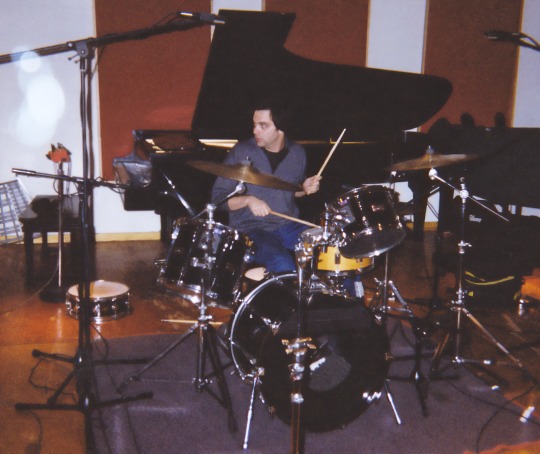
We were in the middle of recording when we heard the news that Princess Diana had died in a car accident. The story ran all week in the papers. We were also in the studio when we heard Mother Teresa died. There was little mention of her passing in the news. Jude remarked the lack of coverage was kind of strange. Adam looked thoughtful, walked over to the piano, sat down and sang "goodbye little nun, though we didn't know you at all, you had the strength to stand though you were barely five feet tall..."
He was quick, and he could play anything, any song, any instrument. He played drums, keyboards, guitar and was a fantastic bass player. He had high expectations, people around him would rise to the occasion.
We were recording a song called "Silver Shine," the basic tracks had been laid down, Jude and I were overdubbing parts. I was playing electric guitar and had just done a run-through of the song. Adam said, "Wow, it sounds like you've practiced really hard!" I proudly said, "Yes I have!" I felt pretty good about myself at that moment. Andy rolled tape, Adam came up behind me and clamped a capo on the neck of my guitar, which instantly made me lost and confused. Tape was rolling, I didn't know where the notes were anymore, I just started playing. That is the take heard on the track and the best I've ever played guitar.
Adam was overdubbing piano on a song called "Happy Go Luckiness." The song meanders, so he needed me to stand at the piano and count out measures with my fingers so he could look up and know where he was. I was dutifully counting, he was playing, it was so beautiful I started crying. I lost track of where we were, he looked up and saw my tears and just rolled his eyes. You can hear on the track that moment when he started comping on one chord, lost, waiting for the voices to come in so he could orient himself.

He rolled his eyes at me, but I knew deep down he cared. So I went into the control room, winked at Andy and told him, “Now I want to record a track of slide guitar." I knew how much Adam disliked the blues so when Andy rolled tape I started playing every blues lick I knew, pentatonic clichés everywhere, total crap.
When the song stopped Andy yelled, "You're on fire! That was the best you've ever played!" Adam had a habit, when he was nervous, of picking up a roll of tape and tearing off little pieces. I looked over at him, bits of tape were flying around, he looked very worried. I said, "Right? I'm on fire! Andy, since I'm playing so well today, how about another take?" Adam jumped up and started to protest, "Wait, stop, are you sure you like this? No, no, wait, wait..." Andy rolled tape and I played the part I had always intended to — two simple notes in the chorus. When it was over Adam said "fuck you" and left the room. It still makes me laugh. I loved Adam.
To me, every song on Brompton's Cocktail sounds like a single. I read an interview where it sounds like Robbins was excited about the album. What do you think happened?
Thank you for the nice words! There are many reasons the record wasn't heard, some of the reasons are business related and I can't speak to them. Robbins is a dance label, not a pop rock label, possibly that had an influence. If you look up Robbins online, we are not listed in their roster of artists that have been on their label, but I promise we were. That might be a hint, though, hahaha.
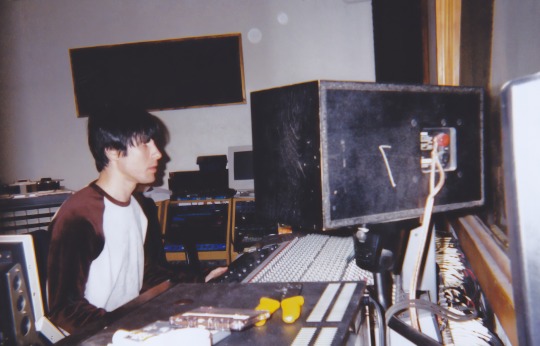
The industry was changing quickly at the time, college radio stations were going off the air, indie record labels and record stores were closing. We didn't have money to tour to support the release. Being female and being gay were not working in my favor. I faced a lot of sexism and felt very worn out by it. By the time it all wrapped up I'd had enough of the music industry. I love Cory, though. He's successfully navigated the business while maintaining his integrity. I admire him.
Adam was killed by COVID in April of 2020 and I'm heartbroken about that. Someone breathed out when he breathed in and a few weeks later he was gone. I haven't listened to Brompton's Cocktail since then, I tried but it made me too sad. I appreciate the chance to talk about it now, it was a very special time for Jude and I and I love remembering all the laughs and good music. Thank you!
I've always been fascinated with Tim/Kerr Records. They had everything from Pere Ubu to Everclear. How did that signing come about?
K.T. Kincaid played bass in Neo Boys and she worked at T/K, so that was my connection. I had only met Tim Kerr once before, but I knew Thor Lindsay (who co-founded T/K) from the time I lived in Portland. He was a lovely man and a big supporter of Neo Boys. Our record release party was held at his record shop, Singles Going Steady. When the band I was in at the time, Two Nice Girls, announced our final tour, Thor called and offered me a contract. There were some great bands on T/K over the years. Thor had good taste.
How did Tiny Top come about? What did you do during the break between Brompton's Cocktail and Tiny Top?
After Brompton's Cocktail was released we got together a great band — Keri Cinquena on drums, Dan Crandall on guitar, Lee Ahlbrandt on keyboards, Andy Loomis on guitar and Jude on bass. We played a handful of fun shows in Austin and on both coasts to promote the record. A bit later I started Tiny Top as an avenue for Jude and I to release a few tracks. I had some health issues at the time that overshadowed everything else, so I was dealing with that.
Tiny Top flips the songwriting team a bit and gives Jude the spotlight. Was that a relief following Brompton's Cocktail?
Yes! We have always written songs together, both music and lyrics, and still do. But medications I had to take wrecked what little singing voice I had. Jude stepped up and said she would try singing. I knew she could hit the notes, she'd done background vocals for years, but she had been too shy to sing much more than that. I love her voice, I wish she had always been the singer, and I think she is getting better with every song we write.
Tiny Top deals with some heavy themes on halfway to everywhere. Is it hard to listen to that album now?
You know, I never have. We put those songs up and I was done. I'm pretty sure the mixes suck because I wasn't well and couldn't really hear at the time. I'm also pretty sure some of the songs are terrible. But I wrote and recorded "Jude" on the sickest day of my life and it's the best song I'll ever write.
"My Lucky Shirt," from eighty milliseconds behind the now, contemplates the life of stuff after we're gone. I've been thinking about that a lot lately. What inspired that song?
That song came to me in one whole piece. Both "My Lucky Shirt" and "Say You Do" were written before I got sick, and they both deal with illness and mortality. I honestly think my subconscious mind was trying to send me an important message about my health.
What inspired the Tiny Top song about Jeanne Manford?
On June 25, 1972 Jeanne Manford, and her family, marched down a New York City street with her gay son, Morty, in one of the early gay pride marches. She carried a sign that read "parents of gays unite in support for our children." In 1972, that was considered a shocking thing to do. She then went on to co-found P-FLAG, which was an acronym for Parents and Friends of Lesbians And Gays. The name has changed a bit but the organization is still thriving.
I never met Jeanne Manford. She died on January 8, 2013. My birthday was the following day, Jude and I were walking out the door to celebrate it when we got the news. Hearing that she was gone deeply depressed me.
My parents were unloving and intolerant. The idea that a gay child might have a parent like Jeanne Manford, someone who would love and support them, was unimaginable to me and probably to almost every gay individual alive at that time. I admired her so much. To me she represented hope and the idea it might be ok someday to love myself after growing up shaken by so much disdain and judgment.
I told Jude I no longer felt like celebrating. She said, "Write a song, that's what you always do when you're sad. What would you say to Jeanne Manford if you could speak to her now?" I told her I always wished for someone like Jeanne Manford in my life, and if I could say one thing to her I would ask, "Will you walk with me, Jeanne?" So I wrote that sentence on a piece of paper, we cried, then went out to celebrate Jeanne Manford's life.
youtube
Tiny Top starts to expand things in a new direction, but Shimmer is a bigger leap. What was some stuff that influenced you to put synthesized sounds at the forefront?
I liked synths well enough growing up, but in the 1980s people started to use them to poorly replicate other sounds — a horn section or a Rhodes electric piano. Like most of the rest of humanity I started to feel like synthesizers were crap. But in the 1990s I heard Nine Inch Nails, Radiohead, Air...and they reminded me that synths can sound awesome and beautiful.
I could never afford a synthesizer, but Adam Schlesinger had a Roland Jupiter 8 — a huge, intimidating analog synth that I was fascinated by. One day he set it up for me, running it through an old Fender Bandmaster amp. He told me to spend an hour or so just messing around with it. The sound was massive. That got me hooked and the Jupiter 8 is all over Brompton's Cocktail.
Years later when Jude and I recorded "On The Day Of The Forty-Four Sunsets" I used a computer soft-synth for the "string" parts. I didn't like the sound of it very much and decided to get a synthesizer that would be a good fit for Jude's voice. I came across a deal on a Nord Lead A1 so we bought it. Since then we've also gotten an SE Boomstar and a D.S.I. OB-6. I'm a guitar player at heart but I also like to play around on piano and synth, and Jude plays a lot of the synth parts on our newer music.
I bought a few guitar pedals during lockdown. I realized often times I like the sound of the pedals more than I like the sound of my guitar. I record my guitar on a different track than I record the audio coming from the pedals, then I erase the guitar. So some tracks that sound like synths are my electric guitar minus my electric guitar.
the weather inside is dedicated to Adam Schlesinger. That's such a personal EP, yet it kind of fits some of the things everyone experienced during the height of the pandemic. Was it therapeutic to make it?
We decided to make a "lockdown" record. During the first spring of the pandemic our county shuttered all the parks. We're outdoor types, we love to hike and kayak, but we were stuck inside so we needed to make the best of it.
We knew early on the seriousness of the situation (Adam died, Jude is a registered nurse, my father was in memory care) so we were always, and still are, vigilant. We struggled along with our community and with our friends, trying to keep our loved ones safe and sustain ourselves.
Writing the music kept us busy, and thinking and talking about Adam was good for our hearts.
What inspired the devil's parting gift? It seems to take things into a more open-ended direction.
"The Devil's Parting Gift" was a phrase I used to describe the hard lessons I learned about myself (and other people) while I was sick. You go through hell, you come out the other side and are rewarded with the curse of seeing things more clearly, as painful as that is. The hippie generation invested a lot in the myth that "enlightenment" brings peace, ohmmmm, I grew up with that lie. These days I agree with Thom Yorke — "the truth will mess you up".
I don't know exactly what you mean, but I like the idea of "open-ended." For both Jude and I, making music has been a life-long process of getting over our insecurities, our troubled childhoods, our preconceived notions, our self-criticism and doubt. We're still on that journey. Without music I wouldn't have survived.
What music have you been listening to lately? Anything you think people should check out?
Lately we've been listening to a lot of music out of Phoenix, AZ, like Garrison Jones and Alassane. There's a vibrant scene there (or was pre-pandemic). Some critics call it new jazz, I don't know about that, it's just music that flows freely and sweetly. Check out Alassane "The Chaser."
Photo captions: The first photo is of Jude O’Nym and Meg Hentges at the 1999 Austin Music Awards, where they played with the band to promote the Brompton’s Cocktail. The second photo shows Adam Schlesinger playing drums during the Brompton’s Cocktail recording sessions at The Place. The third photo is of Andy Chase engineering Brompton’s Cocktail.
1 note
·
View note
Text
Article: The story of Marcy, the least nu metal band on Flip Records

One of the more annoying trends in writing, to me at least, is unnecessary detail about an author’s journey to write an article. As a reader, I usually don’t start reading to hear about how you couldn’t quite write about (insert high profile celebrity’s name here) the way you wanted to. I just wanted to learn about something new.
So, I’ll save you all of that and sum it up this way: I’ve been wanting to write this article for 2 years and haven’t been able to figure it out. I’m going to try my best. Marcy is a band you should know.
It starts out with Atlanta teenager Lisa Fletcher tinkering with a 4-track in the late ‘80s that her parents’ bought her. She showed the recordings to her brother Brian. He played drums in some local bands (such as A Few Kids with Bicycles) and, in the early 90s, suggested they go record the demos in a studio.
Daniel Owens, Marcy’s original bassist, said the band was originally named Thumper. For reasons not entirely known, they upended it for something from the Peanuts universe.
“To me, and I could be wrong, there was subliminal reference behind the name,” Owens said via email. “It could be construed as a direct tribute to the [Charles] Schulz cartoon, where the character Marcie was a tomboy and best friend (?). To that point and in retrospect, the name was a good fit. The fact that in the early to mid 90’s women in indie rock were becoming such a driving force and finding their own individual selves through it, that was us."
Owens, who played bass on Marcy’s demo and first 7,” met Fletcher through her brother Brian.
“I knew of Lisa, the little sister, during this time,” Owens said. “She was super cool and aloof, wore a shit ton of black everything. Brian would tell me about how talented she was, writing these bits and pieces of songs. Even though we never really knew each other, I was always intrigued where she would end up.”
Owens remembers being back in the area during college and jamming with Lisa.
“We jammed a few times in her parents’ basement with a couple of friends trying to not to sound like Throwing Muses, but still hoping to at the same time,” he said.
Brian helped the song “Arthur,” one of Lisa’s demos, get some airtime on the University of Georgia's radio station. This helped generate some buzz.
“I think we recorded 3 songs with no plans beyond that,” Lisa said via Instagram messenger. “The songs got passed around town and got a lot of interest, so we decided to start playing out and shortly after signed a deal with a local indie label.”
“Since I guess I had time spent with the both of them, they asked me to go into the studio to start fleshing out Lisa’s 4-track ideas at Furies [a studio in Marietta, GA] with Ed Burdell,” said Owens. “A band was born from that studio session.”
From there, the band put out the Pilot/Charlotte 7” in 1994 on Henry Records. The single is abrasive yet sweet noise pop. It’s catchy but not cloying. It’s clear from the start what would make Marcy stand out in the crowded field of alternative rock in the ’90s.
youtube
This all takes a weird turn when Marcy signs to a larger label.
Ichiban International, a distributor that also ran Ichiban Records, had a partnership with Flip Records. If Flip sounds vaguely familiar, it should. It released some of the most popular nu metal albums during the genre’s heyday including Limp Bizkit, Cold, Dope and Staind. This was the label that signed Marcy (through Ichiban).
Early on, Flip hadn’t found its niche and tried out a few different sounds. This ranged from art pop to hard rock to George Hamilton’s son’s band. For more about the other releases, go here.
Marcy gets signed to a label that has a sizable distribution. To add to the excitement, they got Mercury Rev bassist and Flaming Lips’ go-to producer Dave Fridmann.
“We were all huge Mercury Rev and Flaming Lips fans, so when it came time to find a producer for our record Dave was the obvious choice,” Lisa said. “I remember when we got the news that he had agreed to do it we all just lost it...it was so surreal and exciting and, at least for me, kinda terrifying...because, you know, it was Dave Fridmann.”
Marcy guitarist Calvin Florian helped set things in motion.
“I took a Polaroid of myself waving, wrote a letter and sent a demo cassette (King Mattress) to Dave and mailed it to him,” Florian said via email. “Basically, said we were looking for a producer and liked his work and would he be Interested...then, as you know, I think he called me and we chatted about him coming down and that’s when he came down and hung out at our practice space. Months after he said they still kept the Polaroid on their fridge at home.”
When listening to the two songs from the Henry Records 7” against the versions that ended up on the Fridmann produced album, it’s clear there weren’t big compromises. The vocals are a bit clearer and there are some other minor touches (this is not my field of expertise, please don’t try to make me elaborate more). Otherwise, the band’s vision stays intact while bringing things into sharper focus.
The album cover is honestly why I bought this CD and why I’m writing this in the first place. A very ’90s stripe composed of blue, silver and orange lines runs across the middle. A confused (sad?) looking polar bear is above the strip. Below the strip simply reads Marcy. Between that and the Flip logo, who wouldn’t take a chance on it? The cover was done by John Otto.
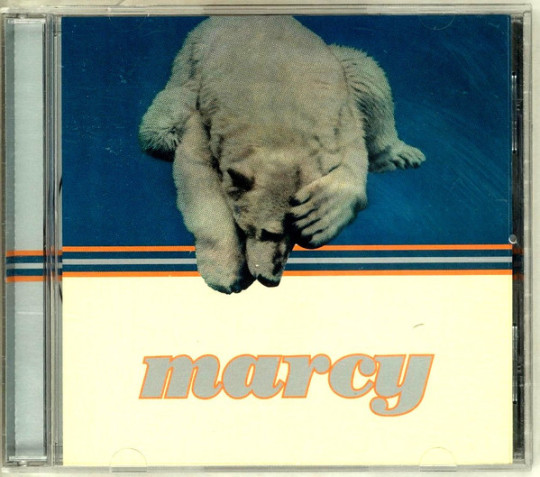
My first thought might be yours too. This is a John Otto designing a cover for a Flip Records release. But this isn’t Limp Bizkit’s drummer. In a truly bizarre coincidence, this is another John Otto entirely.
“I had forgotten that there were two Johns,” Florian said. “John Otto was the design guy at Flip.”
The band recorded its 1997 self-titled debut with bassist Steve Quinn. To be honest, this album grew on me a bit with each listen over the two years I’ve had it. It features these big, hulking guitars but slips just as easily into gentle passages. If there’s an overarching theme it’s trying to a make sense of a world that’s often unkind to women. It’s catchy but has this odd, otherworldly quality. It doesn’t feel like a forced posture. It showcases a band brimming with potential.
According to Brian and Lisa, the band broke up a few months after recording the album.
youtube
“It isn’t clear to my brother and I if the breakup is why they decided not to release it or if there were other factors involved (one theory being that we didn’t fit into their roster, style-wise, anymore),” Lisa said. “Flip decided to release it after all, so I assembled a new group of guys to tour in support of the record. I have no memory of playing shows with them, but Brian confirmed that I played a record release show with them and he talked about how surreal it was for him, watching other people playing our songs.”
Florian doesn’t remember Flip stalling the album, though he said it does make sense given the direction the label was heading in. He said he thinks John Broadus, who assisted the band in getting a record deal, helped push the album to get released.
Marcy did a small east coast tour supporting The Velvet Underground drummer Moe Tucker. Tucker was touring her album I Spent A Week There The Other Night. The album, which is fantastic, came out on Sky Records and was distributed by Ichiban. Marcy also shared stages with Yo La Tengo, Juliana Hatfield, Seam, Spell, Archers of Loaf, Swirlies and Man Or Astro-man?.

And that’s where Marcy’s story generally ends. The band didn’t release anything else and its original members moved on to other things. Brian played drums with Magnapop on its album Mouthfeel. Owens played guitar and sang in New Roman Times. Florian went on to work with bands like Sugarsmack and Dropsonic. Lisa continues to release music, at a very prolific clip, on Soundcloud.
Owens summed up the end of Marcy this way:
“We were young and idealistic whose wants and desires were different, no matter how much we wanted them to be the same. It will never change the fact to how much these 3 other people mean to me and still do.”
Photos courtesy of the band, except the album over photo from discogs.com
2 notes
·
View notes
Text
Interview: Jihad Rabah (Twelve Gauge Records)
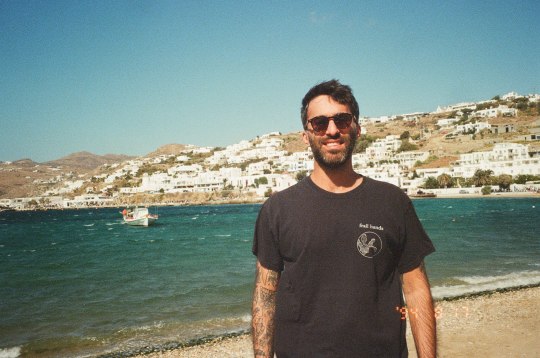
For Jihad Rabah Twelve Gauge Records, the label he founded in 2004 when he was 18, is an extension of himself. The label’s first release was 2005’s Courtside Seats to the Greatest Fuck of All Time by Heavy Heavy Low Low. HHLL became a legendary band in punk/metal circles. The band’s chaotic and surreal output could be polarizing, but was difficult to ignore. It’s since been influential on a whole new crop of artists. In 2019, the record was re-pressed by Twelve Gauge and sold out within hours.
After putting out Courtside, Rabah has released LPs and EPs by hardcore bands with unique voices like Purple Mercy, Sabertooth Zombie, No Sir, Thin, Ghost Spirit, For Your Health and many others. Twelve Gauge is currently based in New York.
The label’s most recent release is a split by the hardcore/metal bands Thin and The Wind in the Trees. Rabah is hoping to get eight releases out this year (if everything goes well).
The punk community is place with a lot of opinions. Some punks think all-out nihilism is the spirit of the movement. Others think the music should be a vehicle for political activism. Rabah, who is Palestinian, doesn’t have the option to stay silent. He was raised in a household where activism was a key component. During last year’s outbreak of violence in Palestine, Rabah used social media to share his story and perspective. Violence has recently erupted in the region, but has gained less traction due to the invasion of Ukraine.
Rabah has also been outspoken about the interconnected struggles of Palestinians with Black and Brown people in the United States facing oppression. One instance of the label’s activism was raising money for the Louisville Community Bail Fund in 2020.
Rabah was kind enough to answer a few questions about his label, politics and why the logo changed via email. Answers have been left as is, aside from some small tweaks for style/grammar.
For me, punk/hardcore/etc. was tied up in politics from when I was growing up. This started with realizing the commentary through sarcasm in Dead Kennedys' songs. That was kind of my "a-ha" moment. Did you have one of those growing up with any band or was it something more gradual?
My path into politics started outside of music. I remember being very young and having Palestine be an everyday topic at home. My parents routinely emphasized the importance of not forgetting my roots, identity, and the ongoing struggle of our people. Being born Palestinian means being born into a life of activism and solidarity (I believe it was Maha from NØ MAN who originally said this) and so my parents were deeply involved in activism. From my early years I remember my dad telling me stories of his allyship and activism with the Black Panthers in Detroit in the 70s.
As I grew up, I started to actually understand what they truly meant, the importance of it, and how interconnected struggles everywhere are. It wasn’t a coincidence that they named me Jihad, which in its true definition is a beautiful word with a beautiful meaning: a struggle for the better. This struggle can be whatever is important in your life and for me this is my never-ending relationship with Palestine and its liberation. (The media and mainstream have bastardized the word Jihad and tied it one-to-one with Islamic extremism but that's incorrect).
I can imagine some labels like to take the approach of being neutral when it comes to politics because it can narrow potential customers. Do you ever get pushback from being an openly political label?
This is an interesting one because I didn’t necessarily set out to be a political label, nor do I really think I am one per se. I think the most basic explanation is that Twelve Gauge is me and I am someone who feels very strongly about certain core values of mine. I'm also someone who struggles deeply with being Palestinian and the completely helpless feeling you have being in diaspora. It's a blessing and a curse but I wouldn't have it any other way.
With that in mind, over the last few years there's been a massive shift in social media around the Palestinian narrative motivated by the related growing calls for justice for brown and black people in America. More and more people are waking up and realizing that this world and system isn't just and isn't fair when it can be. They’re seeing how police brutality in the U.S. is rooted in the same thing oppressing Palestinians in Gaza and the West Bank.
This is where I gained the courage to be more open as a label around these topics. The growing conversion essentially liberated me and helped me feel safe enough to speak out, and I'm glad that I have. Speaking on Palestine specifically does come with a fear of backlash but that’s something I’m no longer afraid of. If it means selling less records, so be it, this is a labor of love for me.
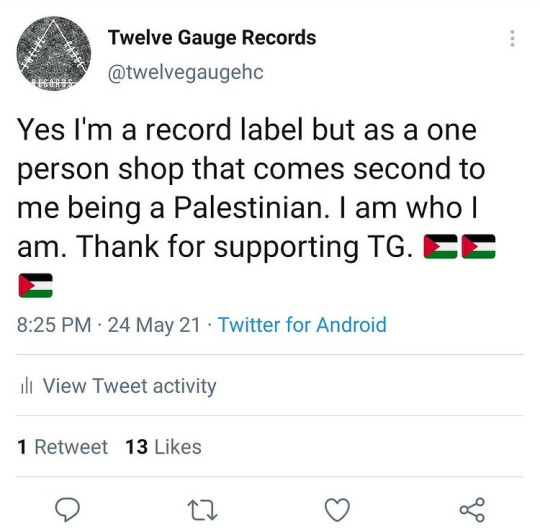
Most of the bands on the label aren't political on the surface. Do you prefer music that's more subtly political or that finds the political in a less obvious way?
I think you’re right in that most of the bands aren’t political on the surface, but you’ll find that a lot of them are at least below the surface. My preference is for bands with a message. What exactly that message is, or how it's presented, doesn’t have to be political. But I try to stay away from gimmicky or joke bands and instead work with bands whose lyrical content or message is that of what I love most about hardcore and punk: being anti-establishment, anti-fascist, anti-oppression, etc. etc.
What is something you feel like the U.S. media gets wrong about Palestine?
Both U.S. politics and U.S. media have a very very biased point of view on Palestine. There is a heavy amount of lobbying that takes place to influence policies and politics around the matter. For example, it’s gotten to the point where it’s illegal at some universities and in some states to be critical of the apartheid state Israel. Peaceful boycotts (the BDS movement) are labeled anti-Semitic and banned from college and university campuses across the country, legislature is in place barring government funding for any organization that supports BDS or is critical of Israel. This is widescale censorship and it stifles any real discussion on the matter pushing forward a very one-sided view of history and current state that erases Palestinian history and further isolates us from the liberation we deserve.
What are some current bands you feel have a really important political message?
There are a lot of bands using their platform and voices to advocate and push for social justice, human rights, fighting inequalities, etc…and this is something I’ve always loved about hardcore so it’s nice to see it see it play out in real time and be more predominant and obvious. But more specifically I’ll call out: MOVE from Boston, MA that advocates for abolition and have been vocal about the interconnectedness of the Palestinian and Black Liberation, ZULU from Los Angeles, CA that called out and brought more attention to the fact that hardcore is a white dominant genre, and RACETRAITOR from Chicago, IL that has a long history (since the 90s) of being outspoken anti-racists and anti-colonialists.
How did the Thin/The Wind in the Trees split come about?
Ever since Thin put out Dawn on vinyl with me we’ve formed a great relationship and have committed to doing a bunch more together. This naturally came up as something that Thin wanted to do with their friends in The Wind In The Trees and I thought it was an awesome opportunity to bring two great bands together. This ended up getting The Wind In The Trees and I to work more together and we have some fun stuff planned as well.
“He Was a Friend of Mine” is a really unexpected turn for Thin. How did covering that John Prine song [EDITOR’S NOTE: it’s actually a Dave Van Ronk song, not sure why I thought it was by Prine] for the split come about?
Ashley has been including acoustic sounds on Thin releases which have always seemed to be well received by folks. To be honest with you, you’ll have to ask him about this one – I’m not fully sure how and why it comes about.

Why did you decide to change up the logo?
As much as I loved my old logo (which by the way Brian from Loma Prieta designed!), it had been in use for something like 10 years or so and I wanted something a little bolder. I have been a big fan of Derek’s work and I had brought up the idea to him which he was excited about and immediately got to work on. I’m stoked on it and feel like it’s a great way for me to present the label for the next 10 years.
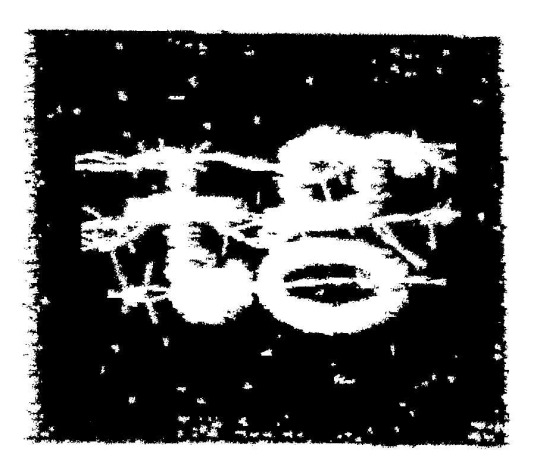
All photos/images courtesy of Jihad Rabah
2 notes
·
View notes
Text
Misinformation: Courtney Love claims Mark Lanegan left her out of memoir in now deleted post
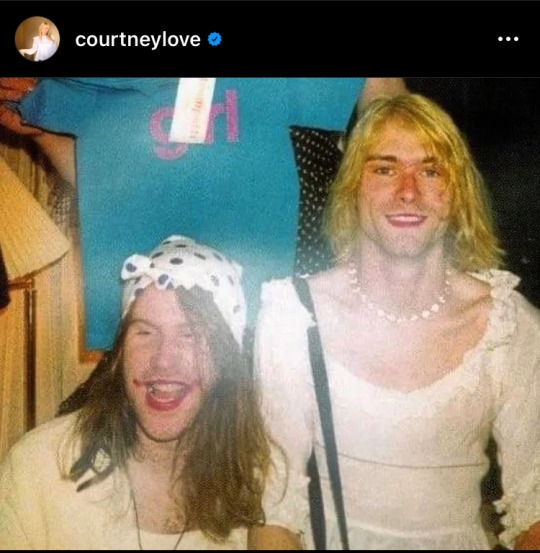
In a lengthy Instagram post featuring a photo of Kurt Cobain and Mark Lanegan, who died recently at 57, Courtney Love decries the sexist publishing industry. In the post she says Lanegan’s publisher, Hachette Books, neglected to include her in his memoir Sing Backwards and Weep: A Memoir. The post has since been deleted and replaced by a photo of Courtney and Mark that reads “safe travels lanegan.”
Whatever kernel of truth about the publishing industry being sexist there is, Lanegan did include her in the biography and credits her for getting him to rehab. Giving the benefit of the doubt here, maybe she wasn’t portrayed the way she wanted to be. That’s fair, however the post states:
“You were a good friend to me & Kurt (even if your book wrote out our close friendship out, I’m still baffled & so sad about that. But sigh. “market forces of sexism #. It is what it is....)”
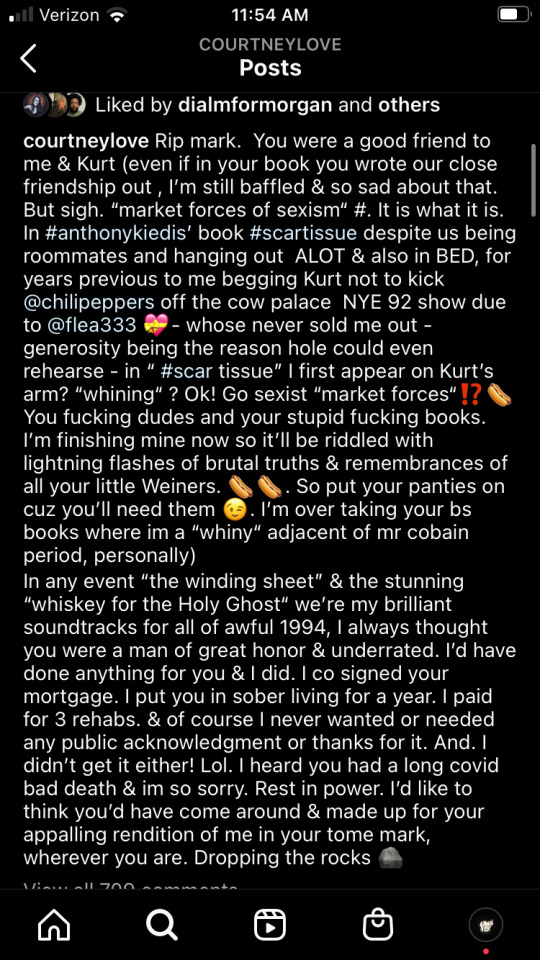
Love is in the memoir. Lanegan even elaborated on this section of the book in an interview with Rolling Stone:
[Rolling Stone] Despite how you felt, you had a lot of people looking out for you. The person who had your back and surprised me the most in your memoir was Courtney Love.
[Lanegan] She was directly involved in saving my life. I had to write about that. I will always carry great guilt about my actions on the day Kurt decided to do what he did, because I willfully ignored him. I had done that because around that time I had become accustomed to trying to avoid being around Courtney. I assumed that she would be there. Also, I was just a fucking shithead who was self-centered and didn’t respond to his friends — even though he would have picked up the phone anytime I called.
Sometime after his death, I remember going into a pawn shop one day, and my friend who ran the place said, “Courtney Love came in here the other day with material about some rehab.” And my immediate response was, “Tell her to shove her fuckin’ rehab.” My attitude was, unless somebody has some money for me or something I can sell or some drugs, I don’t need your help. I was just that kind of recalcitrant shithead drug addict, who’d rather be homeless than accepting anyone’s help.
Later in the interview he says “I owe her a great, great debt that I can never repay.”
Lanegan was the lead singer of grunge luminaries The Screaming Trees. Following the breakup of the Trees, he enjoyed a prolific solo career. He also collaborated with musicians like Isobel Campbell, Greg Dulli, Duke Garwood and Dylan Carlson. He died Feb. 22 at 57 years old.
Lanegan was no stranger to misinformation himself. He initially promoted 5G conspiracy theories about the coronavirus pandemic. Later, he retracted these claims and wrote a book about his experience with COVID.
Love also went on to critique Anthony Kiedis’ biography and mention she is working on a memoir of her own. Maybe in it she will explain what was left out of Lanegan’s book.
As someone who respects Love’s unwavering feminist take on things, in both music and writing, this is disappointing. It plays into the media narrative of her, which has often been overtly sexist. It also maligns a dead person and works to promote the book she’s working on. Not the best look.
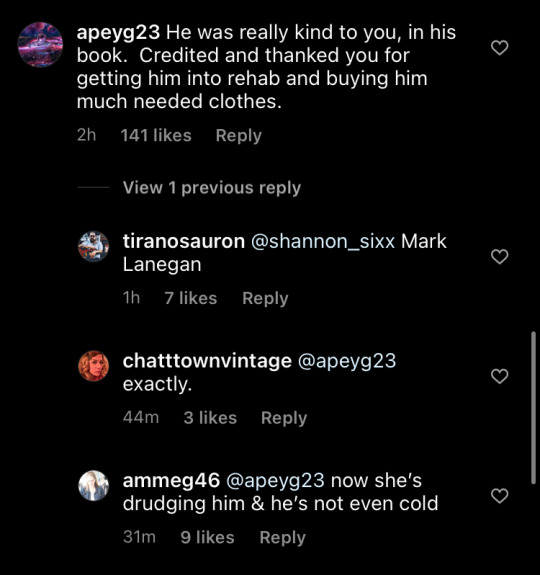
UPDATE at 4:13 p.m.: Post was deleted and replaced with a new post of Courtney and Mark together that reads “safe travels lanegan.”
0 notes
Text
Article: The other side of Flip Records
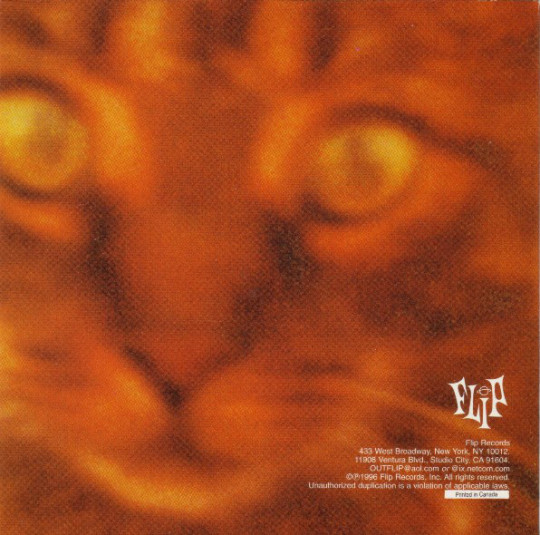
Just the mention of Flip Records, for those who remember, typically triggers images of nu metal. The label released albums by Limp Bizkit, Staind, Cold and Dope. But the label’s image wasn’t always definite. A handful of interesting bands put out albums through the label. Each fell under the alternative rock umbrella, but ranged from punk to pop to experimental. All could’ve grown in popularity. Instead, their albums languished in bargain bins like many post-Nirvana signees.
The label was founded in 1994 by Jordan Schur. It often worked with larger labels on releases (Geffen, A&M and Interscope). In the label’s early days it worked with Ichiban Records to distribute some of its least nu metal releases. Once the label found its niche, it committed and was massively successful. No judgement there, but it’s a shame some of these early releases have been forgotten about.
These are the non-nu metal bands that appeared in the label:
Go! Dog! Go!
This experimental punk band from Baltimore released the 7” Engine with Flip. The band’s sound was kind of near the Brainiac unhinged side of things. Saxophonist Tim Boyd adds free jazz accents over everything. The band eventually released its Mark Trombino-produced 1997 debut, Glad to Be Unhappy, on Risk Records. The album is fantastic, but sadly the group’s last.
youtube
Marcy
Great noise-y pop band from Atlanta. This is my favorite band on this list. Marcy’s lone album, released in 1997, is a truly hidden 90s alt-rock gem. It was produced by Mercury Rev bassist Dave Fridmann. The band sort of recalls The Breeders and The Flaming Lips, but has its own unique spin on the sound. This music does not exist on streaming services. If you see the CD, you should definitely buy it.

Jane Jensen
This experimental pop artist really could’ve broken through with more of a push. Songs on her 1996 Flip Records debut, Comic Book Whore, are both unique and catchy. Unlike other pop stars of the era, Jensen uses experimental recording techniques like putting her voice through different filters. She recorded her follow-up with legendary producer Martin Bisi (Swans, Unsane, Cop Shoot Cop, etc.). Jensen only recorded the one album with Flip before moving on. She’s still putting out music.
youtube
Fine
This glam rock project was fronted by actor/musician Ashley Hamilton (son of George Hamilton). The band’s only album, released in 1999, features some of the same musicians as Scott Weiland’s excellent 12 Bar Blues (including Weiland himself). Sadly, the album is not as experimental as the Weiland album. Against the View is a bit hard to find. Nothing is on streaming services, but you might be able to track down a copy on eBay. Most of it is well-executed glam rock. For fans of that strain of 90s alt-rock, it’s worth seeking out.
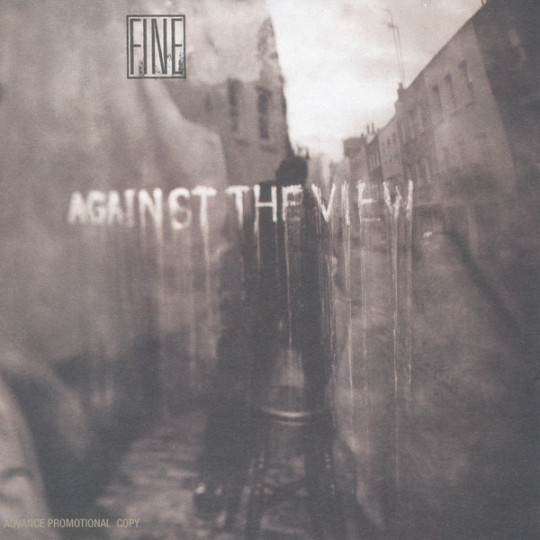
Big Hate
This Atlanta band is not really my thing but, for fans of hard rock, their two Flip albums might be worth seeking out. Sort of more on the classic rock side of things, but with some alt-rock flourishes.
youtube
Tin Star
Not much information about this band exists. I can’t find its music on streaming or even physical copies of its 1996 album. Garrett James Uhlenbrock seems to be the driving force based on the album’s Discogs page. Uhlenbrock worked with artists like Mercury Rev, Vic Chesnutt and (most famously) The Ramones. This is a different band than the electronica group that was signed to V2 Records. I’m sure this album will pop up at a record store one day. When it does, I’ll update this.
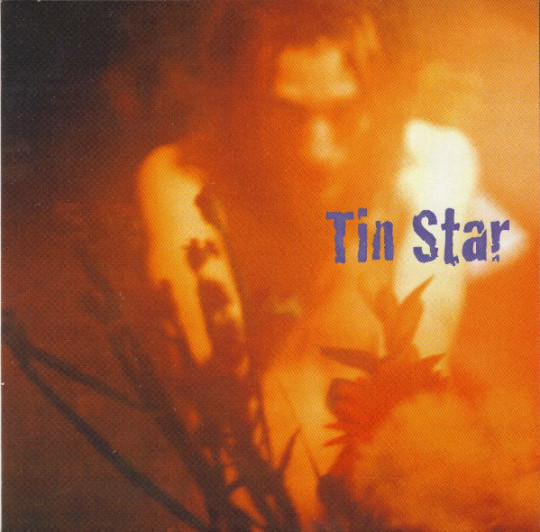
0 notes
Text
Essay: Does genre matter?

No artist wants to be reduced to a classification.
In 2021, genre walls that were once built high by the music industry have become permeable. Modern music proudly flaunts cross pollination. Listen to the radio and you might hear a song where trap, reggae and house exist with little conflict.
I took on a project recently where I organized my CDs by genre. I have about 4,000 of them, so this took a few days. It did not go smoothly. When I was coming of age, a term like indie was not the hollow signifier it is now. In retrospect it was a ridiculous classification, but my brain still reverts to it as something valid. So I found myself sitting on my basement floor, sorting stacks of CDs containing TV on the Radio, Death Cab for Cutie and Sleater-Kinney. By the time I finished the project I felt accomplished, but a little silly. I realized it was a nostalgic exercise and was in no way productive.
I read music reviews religiously when I was a kid (90s/00s). A thing that strikes me now was how reviewers would often reduce an artist’s work to their otherness. For example Basehead, the moniker of Michael Ivey that’s always sounded to me like indie rock with a dash of funk, would randomly get a hip-hop tag. I always wondered if this happened because Ivey is Black. I also remember women-fronted bands getting compared to Blondie or The Go-Go’s even when they didn’t sound like those groups. These restrictions ultimately stifled these bands from reaching new audiences. They reflected the biases of the American power structure at the time.
youtube
Yet as something toxic erodes, something good can be lost.
As a kid I would spend hours on allmusic.com in search of artists that sounded like my favorite artists. Genre classifications were a starting point for finding new artists and even whole scenes. This would’ve been much more difficult in the past, when underground music circulated via word-of-mouth or zines. I saw genre as a beginning rather than something stifling.
Genres could be a shorthand for misfits unifying to form a sense of community. The metalcore scene was big when I was in high school. You’d go to shows and build relationships with strangers based on a love of everything that floated around the genre. While Reddit can facilitate wide-ranging discussion across the globe, there’s something lost compared to those in-person communal experiences (though in 2021 you should limit your exposure to large gatherings, wear masks and get vaccinated).
But this sense of community could turn sour when people let it dictate their life. For example, punk hardliners would feel betrayed if one of their peers listened to Coldplay. When you step back from the insularity of a scene, all of this looks pointless now. Why wouldn’t you just listen to what makes you happy?
In a strange way I feel like I’ve been waiting for this to happen. I always tailored what music I talked about with certain people. But, when I was alone, I would bounce around from genre to genre. I would let my curiosity run wild. It’s nice to live at a time where I can embrace that.
0 notes
Text
Interview: Ben Yost (Kickpop Records)

Kickpop’s first 10” sampler offers up a variety of different. The limited run of 25 records sold out in under an hour, according to the label’s Instagram.
The Flaks have a sound that recalls the skate punk of the 90s with tinges of emo (pretty fully-formed for a group of teenagers at the time). Blank Tape Tax takes a more experimental approach sculpting out something evocative. Logan Gaval of Greet Death’s contribution recalls something that would’ve come out under the Orchid Tapes banner. For Once In My Life’s “Song One” is a math-y screamo dirge. Broadacre’s “My Mother the Carjacker,” my favorite here, closes the sampler on a note of classic Midwest emo.
Ben Yost, 25, runs the Michigan label and has a direct connection with all the bands featured on the sampler. Yost has been playing shows since he was 13. He was kind enough to field a few questions via email. His answers have been adjusted a bit for style/clarity.
Starting a label nowadays kind of entails having a bit of an attachment to physical media. In terms of packaging, can you remember the first CD/tape/record that really made a big impression on you?
The first piece of physical media as in a tape, CD, or record that left an immediate impression on me was a copy of Chess Records' "Sail On" by Muddy Waters. It was my dad's copy of the record and inside was a Xerox he had made of Muddy's obituary. I was also in love with large hole 45's as a kid and would listen to The Who, The Animals, The Doors and stuff like that. When I got a little older and discovered punk, I began collecting 7"s. 7"s with sleeves are really my favorite type of vinyl record product. These days I mostly collect oddities, 12" singles and jazz LP's, but I'll always prefer to have a copy in my hands over streaming. Oddly enough, my favorite physical media for music is actually CD not vinyl (strictly speaking from a listening experience perspective).
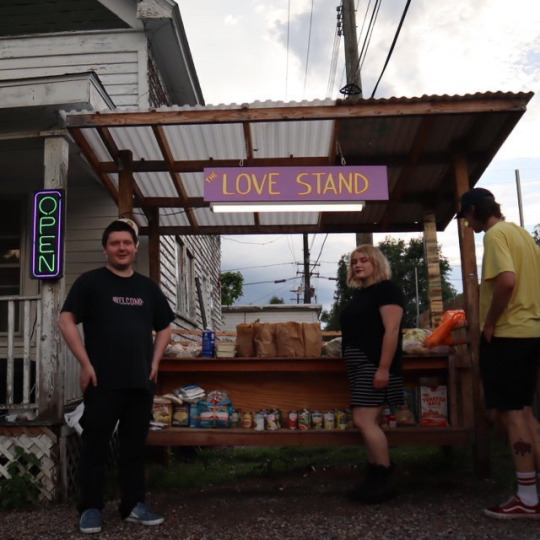
What make you want to start Kickpop? Where does the name come from?
I wanted to start Kickpop Records because I wanted to put out all my own records under one umbrella. I wanted a chance to release my friend's music in a way I've seen done by some of my awesome friends and mentors in Detroit like Eric Scobie from Dropping Bombs records, Brenden Therrien from Over & Out Recordings, and Nick Rorick from Night Fighter Records. I basically saw what those guys did and wanted to be like them.
The name Kickpop is just a made-up word I thought sounded cool. I used to really like the skateboard brand Popwar when I was a kid, I guess I just thought the names sounded similar. Kickpop is also a DJ trick like a scratch or a chirp. I dabble in turntablism and have been producing and making beats for years, so I thought it would be a good name for releasing 12" singles or 7" breaks later down the road. Thus far I've only released my own band's (Blank Tape Tax) music, which is a multi-genre project ranging from instrumental hip-hop to jazz to folk to avant-garde to punk, so the name of the label is fitting.
The bands on the comp all kind of have a fairly different sound. Are there things you personally look for when putting stuff out by other artists?
I've put out other records before starting Kickpop Records, the first big project I did was a pressing of 500 7"s in 2012. I started playing gigs at kind of a younger age and then I worked briefly at two different record stores before doing what I do now. So I've always been surrounded by not only records, but by so many different kinds of music. I really love listening to so much different stuff. Especially after digging for samples while making beats; after studying jazz and really doing some heavy listening; or even just after working in the store. So really I'll put out anything that moves me that I'm in a position to release. At this stage, to be realistic, I can't take on larger projects, but that may change with time. The genre's I am most interested in personally are however, jazz, punk, folk/americana, hip-hop and indie. But like I said, I'll release anyone who I'm able to take on so long as their music moves me.
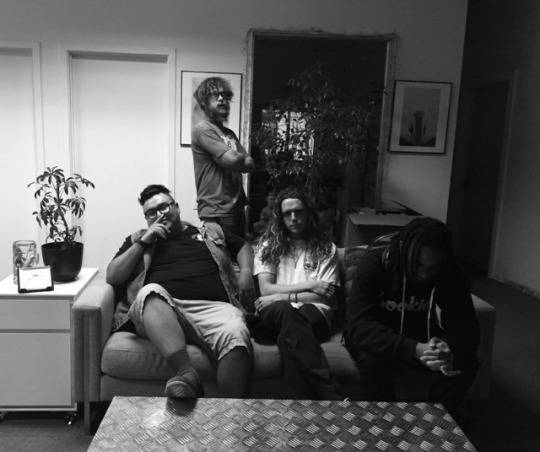
How did you come into contact with each band?
I played drums and wrote the songs for The Flaks. That was my first band. We were together from 2009-2014. The Flaks' song "Cradle Your World," which is featured on the comp, is my favorite song that I've ever written or recorded even though I do not sing it. I met Logan in 2013 or maybe even 2012 at the Flint Local at a Flaks show. Later, I started the band Broadacre with James Schultz of Sunlight Ascending and sang as well as played drums for that project. When I was in Broadacre we would play shows with Greet Death back when they were called Pines. I played quite a few shows with Pines and even played drums for Greet Death for one show in Flint opening for Sweat.

I kind of got a 90s emo vibe from the cover art. Where was the photo taken?
James Schultz of Broadacre and Sunlight Ascending did the album artwork for this comp. The photo is a picture at the intersection of Livernois and 14 Mile in Clawson. Clawson is home to a Jimmy Johns, a Jet's Pizza and a record store (Flipside Records) that many of us from our little scene have worked at (I worked at Jet's and at Flipside, myself). James, myself and especially Nathan from For Once In My Life (also of the band Youth Novel) are really into 90's screamo and screamy-hardcore type stuff. I think that’s where the emo look comes from on the album cover. Logan's song, the Blank Tape Tax song and the For Once In My Life song were all recorded by me on a Tascam Portastudio MKIII. I also think the visuals are trying to match that aesthetic.
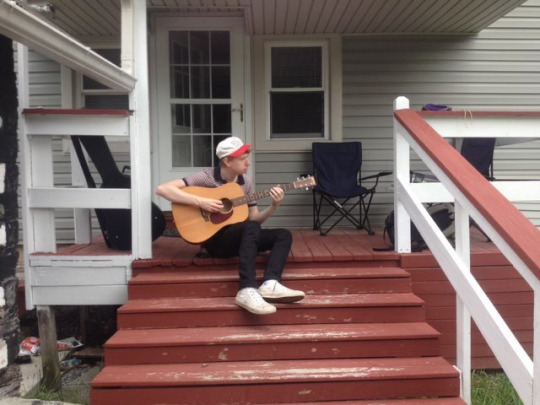
There's one lyric that popped out on the Blank Tape Tax song: "My tears are made of milk/my veil is made of silk.” Is that kind of just an interpretive lyric or is it directly referencing something?
My lyric "In a white silk veil my tears are made of milk" is a lyric in reference to the Black Lives Matter protests of 2020 and seeing people having to wash their eyes out with milk to counteract tear gas. I'll let the listener draw whatever else they want to from the lyric. Everyone involved in this record stands in full support of Black Lives Matter and stands against racial injustice of any kind, as well as prejudice based on sex, gender, ability, or religion.
Outside of the bands on the comp, what music do you think people should try out?
Outside of this record I think that everyone should listen to jazz. It's America's only original artform and is art that speaks to the greatest aspects of creativity, discipline, spirituality and musicianship. The more one learns about jazz, the more they discover just how rebellious jazz is. To quote jazz saxophonist Archie Shepp "[The purpose of the jazz musician] ought to be to liberate America aesthetically and socially from it's inhumanity." And to quote Henry Rollins "The real punk rock in America is bebop." I think that everyone would have a much deeper understanding of the American condition if everyone listened to jazz. I suggest starting with modern jazz, like Thelonious Monk. Or listen to some contemporary players like Geri Allen (RIP) or Ambrose Akinmusire. Or if you're in metro-Detroit try to catch a set by my friend Louis Jones' quartet or Alexis Lombre.
All photos courtesy of Ben Yost: Photo 1: Blank Tape Tax, photo 2: For Once in My Life, photo 3: Broadacre photo 4: Logan Gaval. You can stream the sampler here.
0 notes
Text
Article: The connection between Minor Threat and Kottonmouth Kings

What do the most prominent stoner rap and straight edge bands have in common? A band called Doggy Style.
Members of Kottonmouth Kings and Minor Threat actually played in a band together. The connection is a testament to the strange connections within the punk community.
Brad Xavier fronted the skate punk band Doggy Style that formed in 1983. The band began on the infamous Mystic Records, which chronicled the early careers of NOFX, Rich Kids on LSD and The Mentors. Doggy Style played fairly competent skate punk. Nothing too serious, just fun music about skateboarding and dissing cops.
youtube
The band had a weird split, forming two bands with the same name. One version continued in a more conventional skate punk direction. The other, led by Xavier, tried to incorporate funk elements. Brian Baker, former Minor Thereat guitarist/bassist, joined the Xavier faction.
Baker joined the band after befriending Doug Carrion of the Descendants on tour when he was with Dag Nasty. Carrion insisted he should join Doggy Style with him (named Doggy Rock, according to Baker, when he was in the band).
“It was just a fucking shit show,” said Baker in an interview with Turned Out a Punk about the band’s marquee show. “It was so fucking embarrassing.”
His only contribution to the band was on the album Last Laugh. He quickly moved on when he saw the band was moving in a direction he didn’t like.
youtube
Last Laugh is a weird record. It tried for a funk/punk fusion that’s a bit more dissonant. For a punk guitarist that was probably more aware of the skate punk version of the band, it probably didn’t seem too weird. Yet it’s easy to see why he wasn’t thrilled about the new sound.
“It doesn’t sound so ridiculous in retrospect,” Baker said on TOAP. “What Brad wanted to do was kind of a Chili Pepper thing. But this was in 1986. If this worked, the timing would’ve been pretty great.” (In the same interview Baker says he “cannot stand” the sound of the Red Hot Chili Peppers).
Brad Xavier and Doggy Style drummer Lou Gaez eventually moved on to Kottonmouth Kings. Yet Xavier didn’t have a clean break from punk. His band subsequent punk band, Humble Gods, put out a few records and had a deal with Hollywood Records. The band’s second record even featured the last recording of former Pennywise bassist Jason Thirsk. Humble Gods also released a record on Suburban Noize (a label he co-founded) which is deeply connected with KMK.
youtube
Baker would move through a few projects (including Dag Nasty again) before he ended up with Bad Religion. He’s still with that punk institution and it’s a good fit. The band continues to crank out its signature politicized melodic punk today.
Carrion would also wind up joining Dag Nasty. He also continued to contribute frequently to Kottonmouth Kings projects throughout the years. He currently performs with the punk group Field Day.
In a previous era, punk scenes were more insular. Things spread by word of mouth, zines and a number of other roundabout ways. Yet cross-pollination did occur. This is maybe one of the strangest examples of that.
youtube
0 notes
Text
Essay: Concerts weren’t always great
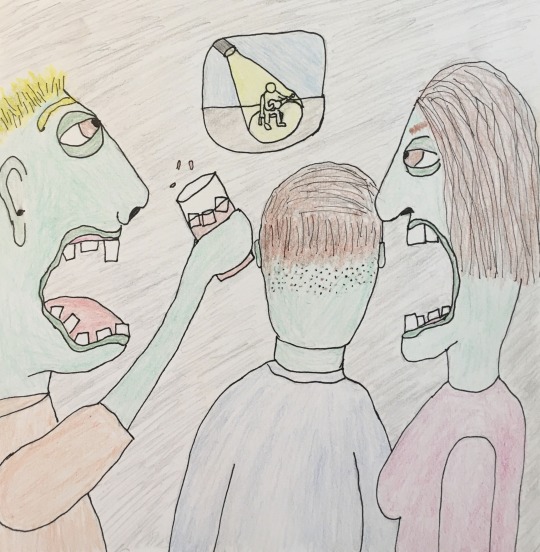
We all miss concerts during the pandemic. But, as with most things we miss, we look to an idealized version. We’re quick to forget the downside.
There are the typical annoyances. Waiting for the band to set up, knees locking up before the headlining act comes on, bad opening acts, etc. Yet these things are permissible. If you’ve been to enough shows, you’ve probably seen one where nothing seems to work.
My worst show has nothing to do with the band not playing the hits or anything like that. I actually prefer when artists try new things out. It was the audience that ruined it for me.
When you buy a ticket there’s a certain expectation. It happens when you see a movie. You enter a theater and it plays, barring some unforeseen circumstance. You might hate it, but it seamlessly plays. Live music doesn’t work this way.
Yet people packed into the Garden Theater expected to see something life changing. Legendary activist/poet and founder of the White Panther Party John Sinclair opened the show. The crowd seemed to have no idea who he was. Sinclair’s set weaved together a series of poems, anecdotes and stories. It was great. Applause ranged from polite to intrigued. I thought it was fantastic, but it helped to know his backstory.
Sixto Rodriguez, the legendary Detroit musician who released two classic albums and was the subject of Searching For Sugar Man, was the headliner. His family performed a few cover songs before he came on. They also became his backing band for the set.
It was not Rodriguez’s night. The apolitical yuppie crowd was not into his long political monologues. There weren’t many songs. The audience wanted the hits and they wanted them now.
Something was off that night. It doesn’t matter what it was, but Rodriguez wasn’t into doing the usual performance. The audience wasn’t encouraging or forgiving. They talked over the performer and called out for songs; they were condescending and impolite. It made me incredibly angry.
It’s one thing to be disappointed, it’s another to be ungrateful. These people were entitled jerks. They made a bad situation worse.
Had they been kinder things might’ve went better. When songs did crop up, they were great. “Street Boy” and a closing cover of The Doors “Light My Fire” were highlights. I can imagine there would’ve been more if the crowd hadn’t thrown a tantrum.
These were people who were used to getting their way. People who paid for something and expected it now. This was the entitled new Detroit. This Detroit wanted old Detroit to perform on command.
This was the worst show ever I went to.
If nothing else, I hope this pandemic causes us to be grateful for what we have. I hope people are a bit kinder. I hope we’re happy to just be there.
I did the poor illustration above, I promise they’ll get better the more I do them.
0 notes
Text
Guide: Lesser-known nu metal albums that hold up
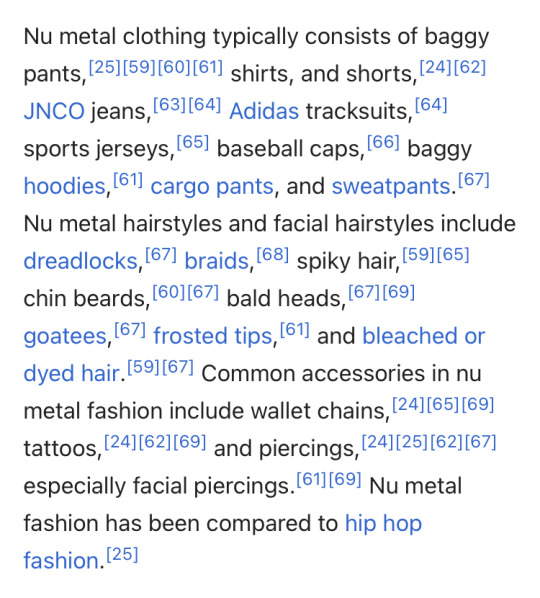
Nu metal is a genre that’s easily derided. It was caricatured as over-the-top angst, baggy jeans and casual misogyny. It was one of the biggest genres when I was first discovering music.
There was plenty of bad music, but to say it was all bad would be inaccurate. It was extremely diverse compared to other metal scenes. It also put issues like child abuse to the forefront, showing survivors they were not alone. Nu metal took a genre that was showing signs of wear and reinvented it. While it soon became saturated by faceless bands (as every popularized genre eventually does), it was important.
As the genre regains popularity, there have been plenty of retrospective lists about bands like Slipknot, Deftones and Korn. There have even been lists detailing some of the lesser known bands. The podcast Roach Koach has done a great job reassessing the genre (It was the catalyst for me making this list). In no order, here are seven nu metal albums you might be less familiar with but are worth your time. These all roughly come from the genre’s original era of popularity. I’ve also put together a ranking of more established nu metal records at the end.
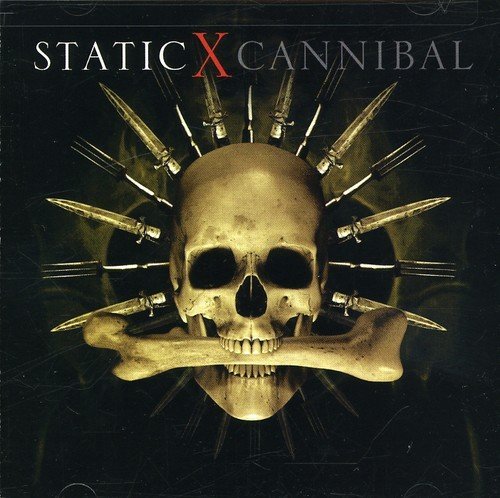
I love the first couple of Static-X albums, but Cannibal is truly a high-water mark. It’s catchy, concise and extremely heavy. While it has some more straight-ahead metal flourishes (guitar solos!?!), no one could mistake this for another band. And, if nothing else, Static-X is a definitive nu metal band. Cannibal seems to find Static-X revitalized after kicking out a problematic member. Vocalist Wayne Static (who died in 2014) knows exactly what he wants these songs to do. His barking delivery finds spaces in each of these spartan industrial rippers. It represents all the things I like about the genre.
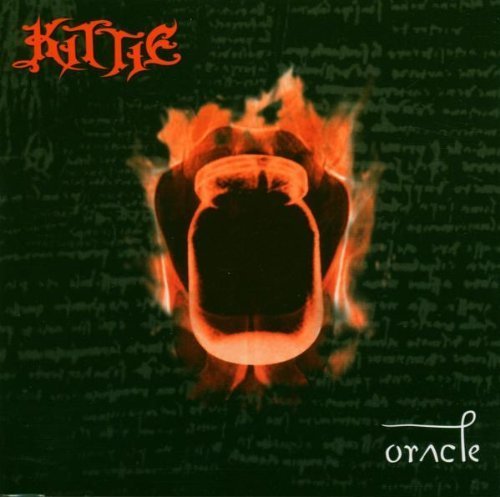
Oracle represents somewhat of a break from the more straight-ahead nu metal sound of Spit, so it might not exactly fit on this list. But ultimately Kittie is forever tied to the genre (much like Deftones), even if they’ve branched out in other directions. Oracle doubles down on heaviness by incorporating death metal influences. Morgan Lander’s vocals kneecap a lot of her more melodically inclined nu peers. It also shows the band progressing, despite losing guitarist Fallon Bowman. When people dismiss the nu metal as an outlet for white male whining, though sometimes deserved, they overlook great albums like Oracle.
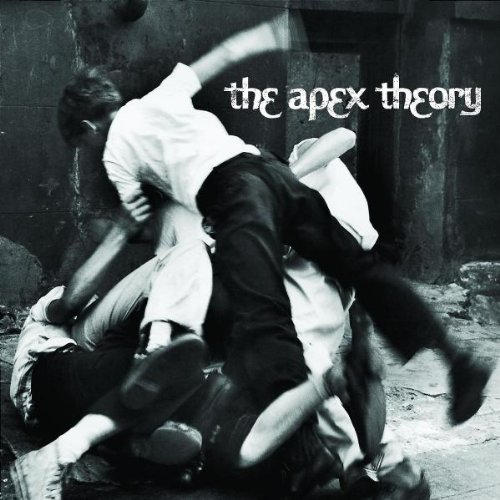
Apex Theory’s only album, Topsy-Turvy, is brimming with creativity. Much like System of a Down, which originally featured lead vocalist Ontronik Khachaturianon on drums, the band channels its Armenian heritage. Yet Apex Theory leans into something more melodic, mathy and possibly emo (in more of the At the Drive-In sense). Every aspect of this album feels so precise and thought out. Khachaturianon’s vocals can leap out like a barrage of stream of consciousness yet can just as easily smooth out. It might’ve been a bit too weird for radio but, in a world where SOAD broke, it certainly could’ve happened.
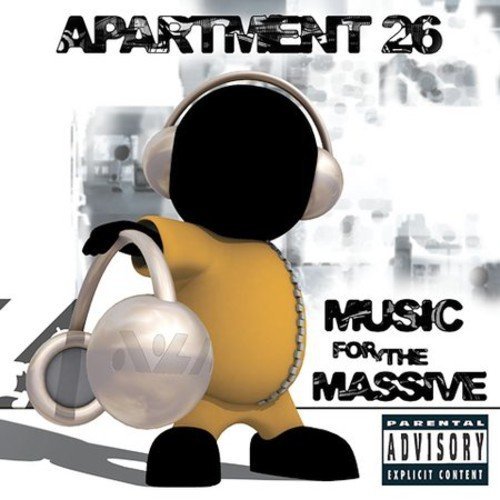
Apartment 26’s final album might be one of the strangest on this list. It’s apparent that it was made to be more “marketable.” Yet those touches make it even weirder. The production here is very polished, but this is still an album that incorporates swing jazz into metal through programmed horns. It’s that oddness, intentional or not, that benefits Music for the Massive. An added bonus is the great cover of “In Heaven” from David Lynch’s Eraserhead (the band’s name is a reference to the film). Apartment 26 easily surpasses its legacy as Geezer Butler’s son’s band on this album.
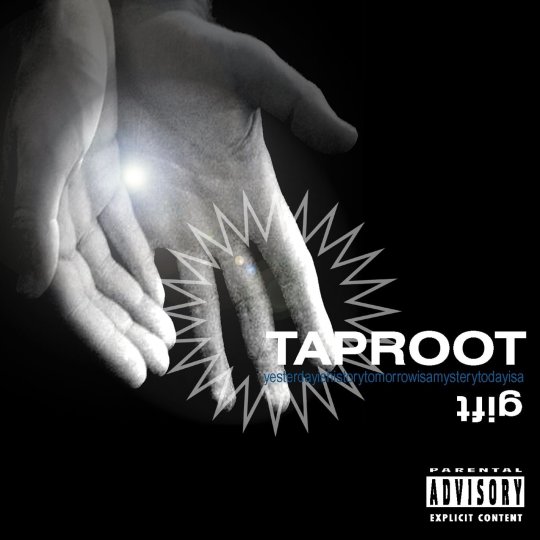
Taproot’s debut struck on something deeply vulnerable that the band has carried through on subsequent albums. What is often missing on those other albums, though, is the heaviness found on Gift. The band’s raw talent is on display here, recalling System of a Down’s debut. Like that album, influences peek through but the band sound fully formed and unique. Stephen Richards’ distinct vocals, while not for everyone, bend around every twist and turn of these knotty songs. The band moved away from the genre, but created some of its best work within it. Oh, and bonus points for instigating this.
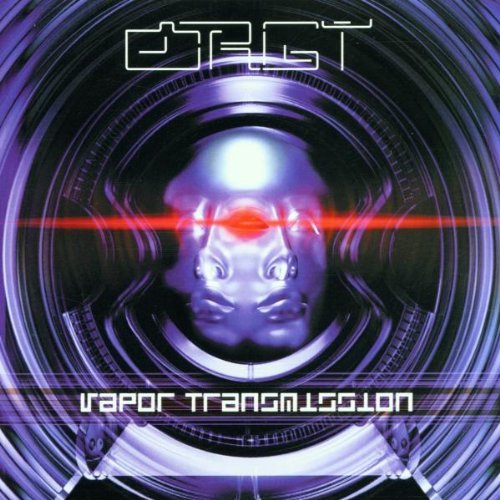
Orgy’s goth-y, processed guitar crunch was often imitated (Deadsy, etc.) but has never exactly been replicated. Candyass in some ways seems like the obvious choice, but there are some awkward growing pains. And really Vapor Transmission is just as good and possibly better. The hooks are bigger, the band commits to the futuristic themes and vocalist Jay Gordon is at the top of his gender-bending industrial crooning game. Orgy remains notable in this era for poking holes in the genre’s inflated macho exterior at every turn. There’s something so transgressive about the way the band operated in nu metal.
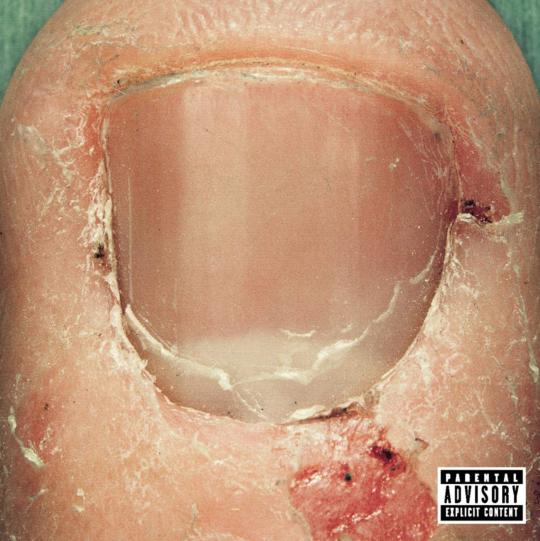
New Killer America’s cover always caught my eye when I was a kid. Album art was and still is a big deal to me. I love how subtly gross this is. At the time it was more affecting than the over-the-top gore common on metal albums. It fits the music. Skrape wallows in heavy post-grunge sludge. As Ulrich Wild did on the Static-X albums, there’s a good balance struck between heaviness and accessibility. Skrape had a mysterious vibe that was missing from similar acts that had a tendency to over-share. Despite some awkward vocals/lyrics that come up, NKA is noteworthy.
Honorable Mention: Coal Chamber-Chamber Music, Powerman 5000-Tonight the Stars Revolt, Nothingface-Violence, Mushroomhead-XX, Sevendust-Animosity
Established Classics Ranking
1. Korn-Korn: This was the album that started the genre. Every element that other bands would copy is here. It also features some of the rawist emotion ever recorded (”Daddy”) and some great singles (”Blind,” “Clown”). Some of the lyrics are definitely dated, but there are few metal albums that are as influence and heavy (well, in terms of subject matter) as this.
2. Deftones-White Pony: This album defied every stereotype the genre had. It seamlessly incorporated trip-hop and post-rock influences without sacrificing any of the heaviness. This is the highpoint for a band that rarely has a misstep.
3. System of a Down-System of a Down: SOAD’s debut is heavy, political and completely left-field. It still sounds like nothing else. All of the band’s records are good to great, yet I love how the death metal influences poke out more on this one. That’s a personal preference I guess, I really could’ve picked any SOAD album.
4. Sepultura-Roots: This album is so unbelievably heavy. It’s such a bummer that Sepultura didn’t make a record with this lineup past this point. It’s political in a way a lot of nu metal wasn’t. It seamlessly incorporates the band’s Brazilin heritage. It up-ends any perception about the genre being light-weight.
5. Slipknot-Iowa: This is really the only album from this era that rivals Roots in terms of heaviness. The band draws from a different well than Sepultura, packing Iowa with horror movie imagery. Much of this was to no doubt channel vocalist Corey Taylor’s troubled childhood. There’s something so frantic and desperate captured on this album, which probably has to do with Ross Robinson producing it (he produced Korn’s debut, as well as a lot of other iconic records).
6. Incubus- S.C.I.E.N.C.E.: Few nu metal records are this legitimately fun. Every part of Incubus is bursting with stoned creativity here. It also channels its influences much better than its peers. Somehow metal riffs and bongos go together here. S.C.I.E.N.C.E. showed a more easygoing side of the genre that still retained all the heaviness.
7. Linkin Park- Meteora: Though Hybrid Theory has a lot of singles, I always preferred this one. I think the band forged a bit more of its identity here. It gets a bit heavier, yet retains all the pop smarts. Definitely worth revisiting if you’ve just re-listened to Hybrid Theory to celebrate its recent anniversary.
NOTE: Yeah, Limp Bizkit is not on this list. The band has some cool songs, but ultimately its albums are pretty scattered. Fred Durst is a lot for me to take. The rest of the band is amazingly talented, especially Wes Borland. If its exclusion is annoying to you, please make your own list.
undefined
youtube
33 notes
·
View notes
Text
Essay: Moor Mother deserves a Grammy
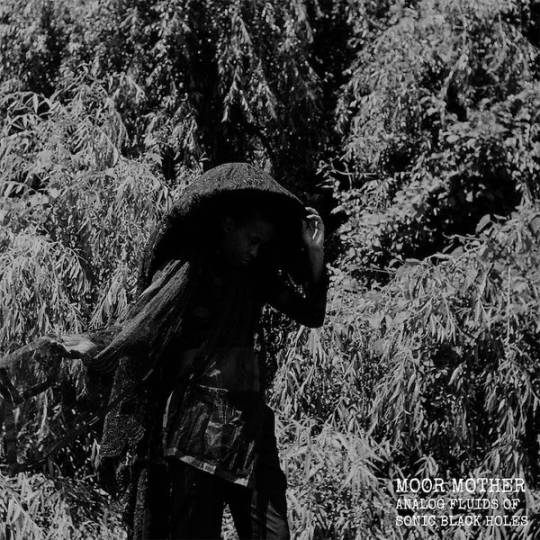
The Grammys are about consolidating power. There are winners and losers, but essentially every artist nominated in a category wins. After the show ends, all these artists will continue to be popular. Outside of this, there are artists that more accurately sum up these difficult and transformative times. For me, Moor Mother is that artist.
Music is often used as a balm. It is used to ease pain and heal. The right song can help unspool tension. Nourishing music is important to the human experience.
Yet music has the potential to do more than this. A more jarring approach is often needed when atrocity exists. Sometimes a contradiction can arise when music is used as protest but is still upbeat. A message can be obscured, oppression can be made abstract.
Moor Mother’s music resolves this contradiction. The poet/musician’s albums are unrelentingly glimpses into the Black experience. They bear the full weight of oppression. This music is an unflinching reflection of oppression. It is accurate, it is journalism.
Seeing a news report on TV or reading an article conveys the details of a story but can often strip aspects of brutality away. The pulsating industrial noise that courses under Moor Mother’s words puts you there. You can hear the dislocation and fear that exists in the current moment. You can feel the weight under the current system.
“LAPD on PCP
Body bag body bag for you and me
And y'all all watch Rodney King
57 hits and the death of a dream
Nightmare shit
LA ’92 shit”
- Moor Mother “LA92″ from Analogue Fluids of Sonic Blackholes
There is something so moving and deeply felt about this music. You don’t put on Moor Mother albums every day. They have to be absorbed. There are new stones to be turned over each time. This is clarity delivered from the center of the storm.
There’s an inherent awkwardness about a white journalist talking about why an artist like Moor Mother is important. That’s why I’m keeping it brief. If you have any doubt about the movement to dismantle white supremacy in America, listen to an album like Analogue Fluids of Sonic Blackholes. That album would’ve (just barely) been eligible for the recent Grammys. It would’ve summed up this year of upheaval and unease better than anything nominated.
youtube
0 notes
Text
Essay: Why am I still doing this?

Note: For Your Health is a fantastic band. Though I disagree with their stance on this, you should definitely listen to their music. I mostly thought it was just a funny image to accompany this.
I got angry at a blog recently.
I disagreed with a lot of it. I found myself alternating between gritting my teeth or laughing throughout it. Yet I empathized with the idea of it.
Mentioning the name doesn’t matter, it feels kind of petty, but it does make me question why I have a blog. Because, for a moment, I felt the same thing people feel when they read things on music in 2021. Especially things they already unabashedly like.
This kind of writing feels obsolete. These days you can alternate between listening to Dave Matthews Band and Fugazi. No one’s going to care, except for crusty old gatekeepers. You can follow your bliss.
I got into music journalism in the early ’ 00s. My dad got me a Pulse! magazine. It was packed with things I didn’t know about. We didn’t really use the internet much. I actually still have the magazine.
I was always more interested in the historical and cultural impact of music. I was less concerned about what a white dude, who REALLY liked Kraftwerk, thought the new Nickleback album sounded like. I usually just listened to whatever I wanted, with varying degrees of secrecy.
The writing I really liked was visceral. I gravitated toward things that went after the comfortable. At the time that kind of thing was rare. Most mainstream press wanted to prop up the same few legacy acts. That’s why a blog like Pitchfork was so revolutionary.
It’s exactly what the blog I hated did. Even if I disagreed with the viewpoints, I also loved it. It got under my skin. While I didn’t walk away with a different opinion, most of the criticism missed any bit of nuance or context, I would defend writing like that any day.
This type of writing is important. It acts as a check on power. It causes us to reconsider our preconceived notions. It’s easy to say “fuck critics.” It’s as universal as “fuck politicians” or, when you’re younger, “fuck school.” It’s harder to wrestle with an idea and try to make your own opinion afterward.
At the end of the day anyone writing about art is just one voice. You don’t have to take their advice. You can listen to whatever you want after you stop reading. But when you listen you’ll do it with the knowledge of “Hey, maybe not everyone feels this way.” On its best day, music writing builds empathy for a different view. On its worst, it tears down artists before they even get popular.
Outside of this blog, I do create things. Most people think writing that criticizes art comes from a jealousy complex about creativity. I write poetry and paint. I haven’t been successful at either but, even with the constant stream of rejection, I keep doing both. I know how it hurts when someone calls you irrelevant. I also know how it can help you get better as an artist.
I’m just one voice in a never ending sea of them. If you don’t like mine, there are plenty of others waiting to reinforce your view. But that reinforcement gets boring really fast. It creates problems, including the ones we’re currently living with. Reading things that piss you off can be healthy.
0 notes
Text
Interview: Robbie Smith (Heavy Heavy Low Low, BONE CUTTER, Downstaaiirs)
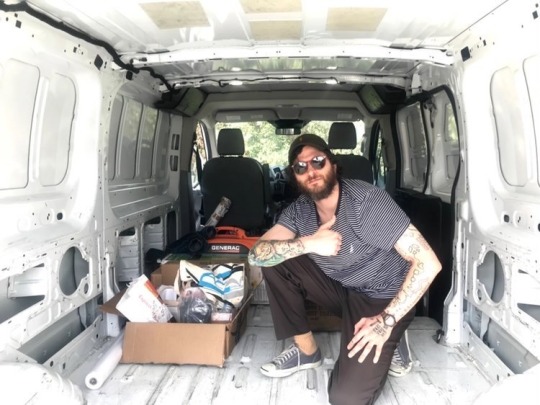
Heavy Heavy Low Low would’ve returned in 2020.
Instead, the pandemic put the chaotic hardcore punk band’s west coast tour on hold. HHLL has released some limited items (T-shirts, tote bags, etc.) to fill the void in the meantime. There’s also an EP by BONE CUTTER, featuring some HHLL members, on the way.
I’ve heard a song on it, it’s pretty wild. The song careens through a few different movements, clawing at something more expansive and open-ended. It’s more gnarled and prickly than HHLL. There are horror movie references. It’s pretty fucking cool.
It always seemed like HHLL never exactly got its due. The band boiled down horror movie plots into brief punk/metal songs. They didn’t fit some of the prevailing trends at the time, but were tied to them anyway. That perception is beginning to change. One clear example is Mario Judah name dropping the band in an interview with Anthony Fantano (Fantano is unfamilar with the band, check it out at 19:40).
HHLL vocalist Robbie Smith was kind enough to talk about various musical and film projects via email. The conversation has been lightly edited to fit the style of this blog.
How did BONE CUTTER start? Did it come from that project a few years back called CUTTER? Who’s in this project?
BONE CUTTER started as CUTTER. Certain life experiences from someone in the band had a hand in changing the name.
Bone Cutter is comprised of Roo Fritter, Chris Fritter, Sam Pura and myself.
Heavy Heavy Low Low recently put out a lot of live footage. Going through it, did it make you miss playing live? Were there any performances that stood out to you from that footage?
Going through that footage definitely made me miss playing live and living a relatively carefree life. I can’t say any set in particular stood out to me, it’s the shows that I remember being in close proximity to the shows we actually filmed that make my side ache.
undefined
youtube
Are there any artists/bands you’re excited to see when things normalize a bit? What are some performances that have really made an impact on you as an audience member?
Sanguisugabogg, For Your Health and Bohren & Der Club of Gore...I really can’t wait to see any live band, really.
Godspeed You! Black Emperor is one of my favorite bands and they’ve always broken me down to some strange core every time I’ve seen ’em. Seeing Mogwai perform their score to Atomic with that film projected behind them was some sad magic. American Nightmare in their prime. Fear Before in a basement right after Art Damage.
Can you imagine how passionate hardcore shows are gonna be when shits allowed to go down? Walls are gonna be blown off in places like San Jose…
Anything planned for Downstaaiirs or are you just focusing, in terms of music, on HHLL and BONE CUTTER?
Focusing on everything! It’s all flowing in some type of way. Downstaaiirs was planning on creating new music before the pandemic.. We’re trying to be safe and considerate, but we are definitely going to create more of that protect.
I’m not sure that we’re going to make more HHLL. It’s always a possibility and I think that playing live shows could definitely fuel that.
Bone Cutter is a project geared toward broad swings in genre/style/yada yada.. We’re about to put out an EP, but we’re already working on another record that is nothing like what we’re about to release.
undefined
youtube
You did a film adaptation of Stephen King’s “Morning Delivers.” What about that story resonated with you? When did you first read it?
The best parts of that story are the things that are not detailed. I first read MD at age 16 and like most of the minor stories in Skeleton Crew, it didn’t have much of an effect until the absent parts of the story kinda metastasized in my thoughts. You fill in the blanks and it’s always more terrifying than anything you could’ve read. That story lends and depends on your imagination. It’s 3 fuckin’ pages. I’ve read a ton of Stephen King, so I filled in the blanks of that story with what I found in subsequent King reads, namely the Dark Tower stuff. I love it.
undefined
youtube
What music have you gravitated toward during the pandemic? What movies have really stood out?
I’ve gravitated toward death metal. I started driving more for work [making good use of a 6-CD changer] and it just made sense. There’s a gnarly band out of L.A. called Mortal Wound. Very big fan of Sanguisugabogg. That new FRATRICIDE record.. Other than that, I’ve been jammin’ the OST [original soundtrack] for Bleu [also known as Three Colors: Blue] by Zbigniew Preisner; CD 1 of 2 of the Discordance Axis best of; and Some Cities by Doves.
And whew, my partner and I have seen so many movies since the start of this thing. Movies are my shit. The Come and See 4K restoration by Criterion is incredible. Sátántangó got a new restoration this year! Fucking System Crasher, a fantastic German film on Netflix, destroyed me. Possessor was fantastic.
I remember (maybe incorrectly) when HHLL was big a lot of people were confused about the band. There was sort of this push to lump it in with "mathcore" and "metalcore" that was taking off at the time. Has time been kinder to the band? Do you find new people discovering the band without all those weird, preconceived notions?
Time has been kind to the band. There was a time where we were lumped into both of those genres, and we do have elements of them, but we never felt comfortable with that. That also resulted in us being booked on some very strange tours. Sounds pretentious to say that people didn't get it, but that's how we felt most of the time. More and more people are discovering the band and there doesn't seem to be that same pretense with labelling music that there used to be. We have such a gloriously diverse group of fans.
undefined
youtube
Were there any bands in your local scene growing up that you think people missed out on? Any current ones?
Growing up, Maida. They signed to Fiddler Records back in the day, but they never really took off outside of the West Coast scene. They were like a more melodic Botch. Hell of a live show.
Currently? I'm kind of out of touch when it comes to local music, especially in the time of quarantine, but Hands of God and These Streets are some super gnarly HC bands folks should hear. San Jose has a huge hardcore scene with an unrivaled energy.
Whatever happened to that Moon Burns project?
Funny, Joey [Camello] and I just started working on that project again!
For more on Heavy Heavy Low Low visit https://hhll38.bandcamp.com/
For more on BONE CUTTER visit https://bonecutter.bandcamp.com/
For I WANNA DIE, another side project, visit https://iwannadie.bandcamp.com/
Photo at the start of the interview courtesy of Robbie Smith
undefined
youtube
0 notes
Text
The story of Grass Records: From Brainiac to Wind-Up and Creed

Images via Grass of ’96 compilation
Everything isn’t available in the streaming era. There are notable gaps in the seemingly bottomless amount of music currently available. Some of the most noticeable exclusions are albums released on Grass Records.
If you’re a fan of ’90s indie music, this short-lived New York label mattered. Though sometimes dismissed as a sibling label to Homestead Records, Grass released over 60 full-length albums ranging from pop to punk to noise to experimental music. It raised the profile of influential bands like Brainiac, Toadies and the Wrens.
The amazing thing about the label is how consistent it is. Every time I thought I was done with this article, I would listen to a band like Baboon and be completely blown away. These are all fascinating, idiosyncratic bands. This is more incredible considering the label was only around for about four years.
Much of this music is hard to find. The odd song might be lingering on YouTube, but you’re almost better off looking at your local record store or ordering from Discogs.
Why are the albums in this weird limbo? Mostly because the monied interest who bought the label in 1996 thought it wasn’t yielding a big enough return on the investment. Grass was gutted and rebranded into post-grunge/nu metal giant Wind-Up. Money poured in and these wonderfully weird records were swept to the side.
The following interviews were conducted via email, Facebook messenger and phone over the last few months. Quotes from the interviews have been edited for style/clarity. I’m eternally grateful to everyone who got back to me. I am also willing to expand this story if more former Grass artists want to reach out. If you’re one of these artists, my email is at the bottom of this story.
Seedlings
“I started in the music business purely by chance,” said Camille Sciara, who founded Grass Records.
Sciara got her start working at Record World in New York as a second job and became friendly with the store’s buyer. After attending a manager training program, she moved on to become a manager of the store. Her second job became her first.
“Then, after two years there, I became bored managing a record store and my friend Mike, the buyer, told me about Dutch East India,” Sciara said. “I started there as a salesperson and, after a year of sales, became the buyer when that position opened up. I never envisioned starting a label.”
While working as a buyer at Dutch East India Trading a friend sent her a Toadies cassette. She “loved it” and started Grass in 1993 to release it.
Grass released the Toadies EP Pleather soon after, which contained an early version of the band’s inescapable alternative hit “Possum Kingdom.” After Pleather, the band scored a major label deal with Interscope. The platinum-selling Rubberneck arrived in 1994.
“They did really well on their first major release,” Sciara said in an email interview. “But then it appeared that Interscope just dropped the ball or lost interest. They were such a great band live, I never understood how they weren't huge stars. And super cool people.”
undefined
youtube
Tall grass
Sciara would go on to sign unique and influential bands like Brainiac and The Wrens.
“Since I had never run a label before, I was going purely on how much I liked what they submitted,” Sciara said. “Obviously not the best business model for running a label, but for the money we offered it worked to some respect. The longer I ran the label, the more I understood what was needed from them [the bands] regarding can they tour etc.”
There were few bands of the 90s that radiated weirdo energy as brightly and brilliantly as Brainiac. The documentary Transmissions from Zero chronicles the significant impact the band had on the music scene at the time. It also shows a band on the brink of mainstream success. Brainiac released two albums on Grass, Smack Bunny Baby and Bonsai Superstar, before departing for Touch & Go. The band’s forward motion was sadly cut short by Tim Taylor’s death in 1997. Prior to this, Interscope was expressing interest in the band.
“If Tim hadn't passed I'm pretty sure they'd have been the biggest [band on the label],” Sciara said.
Original Brainiac guitarist Michelle Bodine said Grass’ association with Dutch East India made the label initially attractive.
“[Camille] was super excited about us and we had total creative freedom,” Bodine said. “We also liked the 2-record deal with the option of 3 contract.”
After leaving Brainiac, Bodine would go on to play guitar and sing in O-Matic. The band released its lone album Dog Years in 1996. The album is one of the overlooked gems of the ’90s.
The Wrens’ influence reverberated in more subtle ways. The band’s first two albums, Silver (1994) and Secaucus (1996), provided a blueprint for much of the post-Pixies landscape of ’90s indie rock. They could’ve been much bigger, but still made a significant impression.
“The depth of realization in this record is unparalleled: every angle is perfected,” Pitchfork founder Ryan Schreiber said about Secaucus. The band’s third long awaited album, Meadowlands, dropped in 2001 and received a “Best New Music” tag from the same publication.
Rumblings of a follow-up to Meadowlands have been thrown around for the last 10 years, but a record has yet to materialize.
The level of talent the label had was staggering. A few groups Sciara thought would be bigger ranged from the Irish dream-pop band Chimera to Georgia punk band Sunbrain. “There's more, it would be long list,” Sciara said.
undefined
youtube
New shoots
Baltimore
Baltimore punk band Liquor Bike had released one album before signing a two-record deal with Grass. The band’s first release on the label was Neon Hoop Ride in 1993. Liquor Bike was excited to be on the label because of the Homestead Records connection.
“We loved being on Grass, we toured like crazy,” singer/guitarist David Koslowski said. “We had great booking with Creature Booking.”
Between the booking agency, which had done work with Nirvana, Helmet, the Lunachicks and Jesus Lizard; and the new label things were looking up for the band. The band would have posters up in whatever towns they were playing in and mentions in the local paper. The label would keep them up to date if they had to do things like impromptu radio interviews. When they got off the road, they entered the studio to record The Beauty of Falling Apart. During this time Alan Meltzer, who bought the label from Sciara in 1996, entered the picture.
“At the onset we were pretty psyched because this guy’s got major label distribution,” Koslowski said.
It also helped that Sciara stayed on after the transition.
“We could still work with Camille, who we love,” Koslowski said. “We slept at Camille’s house when we would play up in New York. She’s an amazingly nice, sweet person and very giving.”
Koslowski said the band was given significantly more to record the follow-up based on buzz the band was getting at the time. J Robbins, of Jawbox and Burning Airlines fame, did the cover art and Drew Mazurek produced the album. The band even hired John Lay, who had previously worked with Squeeze, to manage the band.
“By that point we were having decent guarantees,” Koslowski said. “Those two years when I was on Grass I barely worked a real job. I wasn’t making a rockstar living or anything, but I was certainly able to pay my rent and utilities.”
Liquor Bike went on tour with Gas Huffer to promote the forthcoming record. On the tour Koslowski noticed there weren’t posters out and the band didn’t receive write-ups in the local press. To make matters worse, they never received CDs of The Beauty of Falling Apart to sell at shows. Koslowski said Grass had promised this.
“We were pretty confused," Koslowski said. “I mean our record had been mastered already, everything had been sent to the factory.”
Lay soon informed the band Sciara had been fired and the band had been dropped. Koslowski said the band decided to stay on the tour even after being kicked off the label. The band had old records and T-shirts to sell. They had put a lot of work into the tour and didn’t want to waste it.
Liquor Bike eventually released its third album on Merkin after failed meetings with Amphetamine Reptile, Columbia and Interscope. It was the band’s last before the members went their separate ways.
Seade was another band on on Grass that was unfortunately overlooked. Their lone album (Perf) is an underrated ’90s classic.
Prior to Meltzer, Koslowski said that he didn’t think there was any favoritism toward any one band despite the label being so prolific.
“I just think the woman loved music and wanted to spread that out to people,” Koslowski said of Sciara. “I think she legitimately wanted to help people, you know, help these bands out. She was nothing but giving.”
undefined
youtube
Omaha
Mousetrap, an Omaha-based punk band, hoped to initially get a deal with Homestead when it sent in two 7” singles.
“Camille really liked our singles and got in touch with us.” Patrick Buchanan, Mousetrap’s singer/guitarist said in an email interview. “We developed a great relationship with her, and eventually she offered to sign us — we were given the opportunity to sign either with Homestead OR with Grass, which was a brand-new label at the time.”
Buchanan said the band thought it would possibly get overlooked in Homestead’s large stable of well-established bands and decided to sign with Grass. He also said Sciara made a large difference.
“Camille was one of the coolest people we had ever met in ‘the business’ – she just seemed really genuine, straightforward and honest,” he said. “Those are the types of people we wanted to work with. So our relationship with Camille was probably the main thing that made us sign with Grass.”
Mousetrap would go on to release three albums on the label, starting with Cerebral Revolver in 1993. The band was a big influence on Commander Venus, an Omaha band featuring a young Connor Oberst.
“They were definitely a big deal in Omaha and everybody loved them,” Oberst said of Mousetrap in an episode of the Turned Out a Punk podcast earlier this year.
Commander Venus came in contact with Grass through Mousetrap. The band signed to the label when Oberst was only 14. The band also featured Rob Nansel, who would go on to co-found Saddle Creek Records. Oberst said the band recorded its first album, Do You Feel At Home, in 1995.
“That was a good experience and a learning experience,” Oberst said. “I also think it kind of made it more apparent that even if you do get an opportunity like that, you know, you’re a little fish in a big pond. And maybe people aren’t going to work as hard or care about it.”
He said that this was mitigated by having the support system of a local scene in Omaha. The band ended up releasing its 1995 debut on Lumberjack, which later became Saddle Creek. The band released one more album, The Uneventful Vacation, before Oberst formed Bright Eyes.
undefined
youtube
Promoting growth
Alan Meltzer came into the picture with a retail background. He had previously owned Titus Oaks Records in Long Island. He went on to found CD One Stop in 1985, which was purchased by Alliance in 1993. Meltzer became Alliance’s president during this time but left the company in 1995. Meltzer acquired Grass in 1995 from Dutch East India Trading (the label’s owner/distributor), finalizing major label distribution through BMG in 1996.
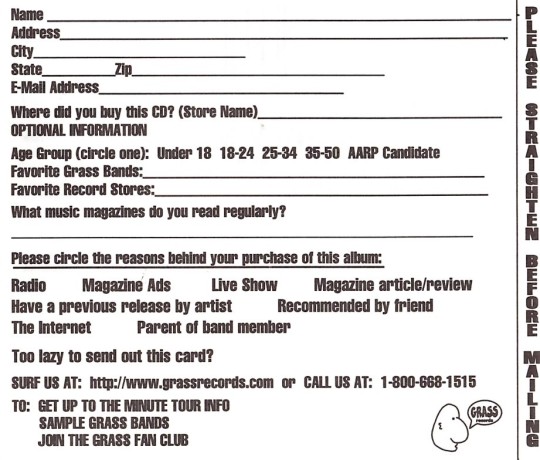
“When I heard the Grass repertoire, I almost fell down,” Meltzer said in a 1996 Billboard Magazine article. “I heard so much good material.”
“Alan was shopping around looking to purchase an established label with an extensive catalog that he could pour endless money into,” Sciara said. “He originally wanted Homestead Records. A great label owned by Dutch East as well. But once he saw the contracts and issues with some of the ‘grey’ areas in them, he then moved on to Grass.”
Meltzer did have some legitimate interest in the label as an artistic venture.
“He absolutely was obsessed with the Wrens once he heard them and Commander Venus,” Sciara said. “He was sure with all his resources, money and big ass staff he could make them huge stars. He failed. Not the bands’ fault.”
Grass would have the name (and credibility) of an indie, but the corporate reach of a major. Meltzer looked at the new situation as the best of both worlds.
“We’re not a major label, but we’re not an undercapitalized, disorganized independent that’s out there on a wing and prayer,” Meltzer said. “We’re somewhere in the middle. We’re staffed, we have the organization, and we’ve got the know-how. I opted for major distribution because the majors are better at it.”
Grass kept Sciara on as a VP of A&R (artists and repertoire) and expanded Grass’ workforce to 20 in-house employees, according to the Billboard article. The label’s future looked bright. Bodine left Brainiac and formed O-Matic (also signed to Grass) when the change happened.
“…It seemed better – they had a nice office in Manhattan with an open stairwell area and glass walls,” Bodine said. “It was very modern and cool. The budget was much bigger. They hired more people and we felt like we had a good support system.”
“When we went there it felt like money,” Koslowski said.
Koslowski only met Meltzer once at a Grass Christmas party.
“He was a typical New York money guy when I met him,” Koslowski said. “I didn’t get a good vibe. He didn’t have that indie spirit that Camille had unfortunately.”
The meeting didn’t go well.
“I remember drinking a bit and messing with him,” Koslowski said. “I said ‘hey Alan I wanted to see if I could run this by you. You know that new Liquor Bike record we’re working on? We got the artwork but we just wanted to run the title by you and make sure it’s cool. We want to call it Eat My Fuck Asshole.’”
Meltzer and his wife were horrified, according to Koslowski.
Yellowing, patchy
In an oral history with Stereogum, Wrens bassist and singer Kevin Whelan said the band was picking up steam.
“So Secaucus came out and it started to do somewhat well and “Surprise Honeycomb” was starting to get recognized and played on different shows, and we thought that international fame was around the corner,” Whelan said.
And then the call came in.
“He [Meltzer] said, ‘Well, boys, I’m not going to give you any more money. If you don’t sign with me today, it’s over.’ So, I remember, we sat in the van, we looked at the empty gas tank and we were like, ‘Well, I guess we’re not signing, let’s get the credit cards out and see how we can get home.’”
According to the Wrens’ website bio, Meltzer wasn’t pleased.
“[Meltzer], infuriated, commences layoffs of involved record company personnel and vows that ‘the next band to walk through that door will be made famous – at any cost,’” the bio states. “The next band through the door is Creed. Grass Records becomes Wind-Up Records. Creed becomes famous at any cost.”
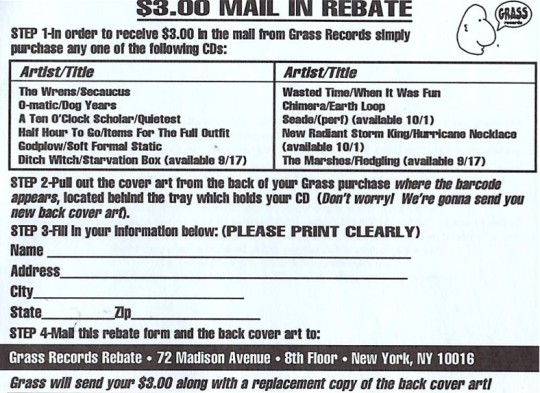
By the time of the Wind-Up transition, Moustrap had already fulfilled its contract when it released its third album The Dead Air Sound System.
“At that time, Mousetrap was not very active,” Buchanan said. “I think we had become rather disheartened by how much time and love we put into the band, while getting very little recognition on any type of national level. At that point we were physically and mentally exhausted by constant touring and recording, with very little in the way of tangible success to show for it. So we didn’t really have any relationship with the label by the time it became Wind-Up.”
When the label wasn’t as successful as Meltzer thought, he brought in Steve Lerner. This was effectively the end of Grass Records.
“I was let go along with 8 to 10 others when Meltzer brought in Steve Lerner to run the company,” Sciara said. “The new staff felt Grass was too much related to me so hence a name change.”
“With Lerner serving as his right-hand man, the duo transformed Wind-up into a $100 million-plus sales operation with multi-platinum acts like Evanescence and Creed,” a 2007 Billboard article said.
Death, new high-yield crops
Grass was rebranded as Wind-Up, a key player in the nu metal and post-grunge universe, in 1997. Many of the Grass bands were dropped to make room for the likes of Finger Eleven, Creed and Evanescence. Meltzer, who ran the label with his wife at the time Diana, finally found his cash machine.
“I was extremely happy because, although Creed was a mega-seller and saved his label, I wanted nothing to do with that and the direction the label was taking,” Sciara said. “Not knocking it. You need artists like that to sustain a label that had an enormous payroll and nice offices. I totally get it, it’s a business. But I was happy running a small label with smaller contacts and cooler bands that didn't have to compromise their sound to write a ‘hit.’ That’s what he was always looking for.”
The transition to Wind-Up in 1997 did have some overlap with former Grass artists. The second Commander Venus album was released by Wind-Up and Thick (with a later release on Saddle Creek). Pollen, a rough-edged pop-punk act that had released two albums on Grass, dropped Peach Tree on Wind-Up. Baboon’s sophomore album Secret Robot Control was also released in 1997 on the new label.
Slowpoke’s Virgin Stripes, the final vestige of Grass Records, was a co-release with DGC in 1998. The album didn’t break the band, but it’s not a stretch to imagine it could have (especially since it boasted a song as infectious as “Belladonna”). The album retains some of band’s outsider noisy energy, but delivers it in a package palatable enough for the post-grunge crowd. Past this point, Wind-Up focused mostly on its new sound.
Koslowski didn’t initially know Wind-Up was the successor to Grass. One day someone mentioned to him that he was labelmates with Creed.
“I was like ‘wow, OK I guess he got his hit,’” Koslowski said.
Meltzer died in 2011 at 67. He made headlines by leaving $1 to his chauffeur and $500,000 to his doorman. Bodine saw this as frustrating because of how he left things with other Grass bands.
“He owed lots of bands money so it’s just really fucked up that he didn’t pay them/us. Liquor Bike did get theirs before he died only because they were persistent,” said Bodine.
In 2013 Wind-Up was purchased by Bicycle Music Company with distribution by Concord Music Group. In 2015 the two companies merged to form Concord Bicycle Music. Craft Recordings manages the label’s reissues.
https://www.youtube.com/embed/wZBpr1tDktI
Rare strain
Aside from Brainiac and The Wrens, many of the bands on the label aren’t on streaming platforms. The physical releases on Grass are mostly out of print. A sea of fantastic experimental indie music remains in this gray area. This doesn’t seem to be changing.
“Unfortunately, I haven’t a clue about if there are plans of Wind-Up re-releasing any back catalog,” Sciara said. “It’s sad really. Holding peoples’ artistic work hostage or just ignoring it seems cruel. Hopefully Wind-Up did the right thing and gave them back their masters, rights etc. Or at least license it to someone else to release.”
The three Mousetrap albums are stuck in this place.
“I wish more people had the chance to hear our music, so yeah I wish it was easily available,” said Buchanan. “Sure, we wanted to be popular — but the most important thing for us was that we made the music we wanted to make. We always did things our way — for ourselves, with no regrets. So even if the albums are harder to get, we’ll always have the memories — and those who were there to witness it will, too.”
Liquor Bike’s lawyer was able to secure the master tapes and artwork for The Beauty of Falling Apart with no questions asked. The band also has the master tapes for Neon Hoop Ride.
“Crazily enough, Grass did not make us buy Beauty of Falling Apart from them,” Koslowski said. “I have heard from some of my fellow Grass artists that they wanted to charge an incredible amount of money.”
Neon Hoop Ride was remastered and briefly available on streaming services. The album was only available digitally and did not get a physical rerelease.
Greener pastures
Following her departure from Grass, Sciara started Ten23 (Oct. 23, 1996 was the day she was fired from Grass). The label released The Wren’s EP 1135 before folding.
“It seemed like a great idea,” she said. “Didn't put out anything else after that release. It was an expensive endeavor starting a label from scratch, so to speak, and at the time I was unemployed.”
From there she went on to work at the Knitting Factory label group and eventually Narnack Records. She uprooted from N.Y. to move to L.A. to work at the latter. She eventually ended up back in N.Y. where she was a manager at Petland Discounts for 12 years until it closed in 2019.
Buchanan has gone on to release music as Vicious Lovers. Mousetrap has plans to release new music for the first time in 20 years according to Buchanan. Some of Mousetrap’s music can be streamed here:
Michelle Bodine went on to play guitar in Shesus, which was signed to Narnack. The band released an album and an EP before splitting up. Bodine has since been participating in Brainiac reunion shows and was featured in the Brainiac documentary Transmissions from Zero.
David Koslowski went on to play in the post-rock band Vivid Low Sky and the power-pop band Gerty. He currently owns a coffee shop/record store in Baltimore called Baby’s on Fire.
“I loved every aspect of being on Grass, except for the very end,” Koslowski said. “I also loved how diverse Camille had the label. A lot of friends from that time from those bands, I’m still friends with them. It was like a really cool little group of people that all got to share in something for as brief of a time period as it was.”
If you have questions, information or concerns I can be reached at [email protected].
CORRECTION: A previous version of this article spelled David’s last name as Kozlowski. It’s actually Koslowski. Also, J. Robbins just did the cover art for the band’s third album. Drew Mazurek actually produced it. Godplow is a great band but they’re from Minneapolis, not Baltimore.
8 notes
·
View notes
Text
Editor’s note: An end to album reviews
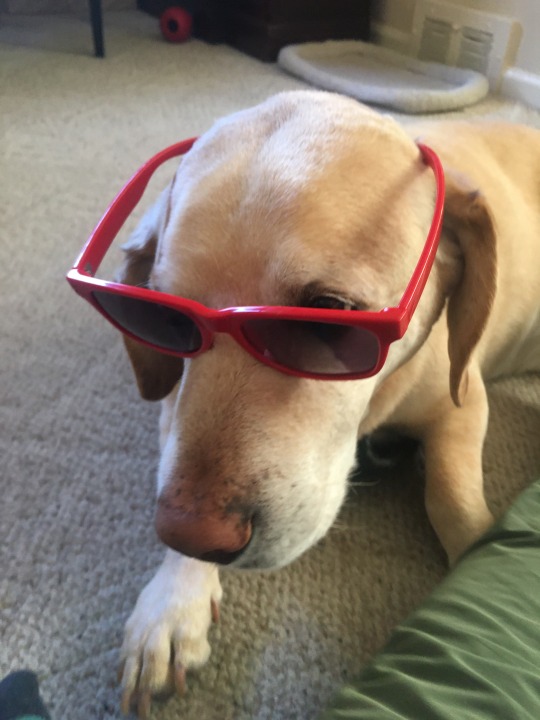
Trout Fishing in Music started out because I loved album reviews. I still appreciate that kind of writing, but I’ve come to realize it’s not what I do best. With TFIM I’ll focus on doing interviews, critical essays, discography guides and (very soon) longform histories. There will still be short reviews on @dustandplastic on Instagram. I considered deleting all the past TFIM reviews, but that felt kind of weird. Either way, I’ve got a lot of new stuff planned.
1 note
·
View note
Text
Interview: Tim Kinsella (2012)

In 2012 my life was chaotic. I was working on my degree at Wayne State University and working two jobs. I was also going through some trauma in my personal life, which I’ve only recently sorted out. During all of this, I interviewed one of my favorite artists. Tim Kinsella has been a part of numerous musical projects (most notably Cap N’ Jazz and Joan of Arc). I was lucky enough to interview him when he did a limited run of living room shows at the time. I wrote an article from the interview for my college newspaper. I really don’t like how it turned out. This interview appears on another Tumblr page I made at the time and have since forgotten all the login stuff (including the email). Joan of Arc recently concluded after over 20 years, so I thought it would be fitting to post it again with a bit of light editing. The interview happens at a creative high for JOA and a commercial low. Kinsella currently performs in Good Fuck.
What made you want to tour living rooms?
It was really a very practical decision. I’ve been working as an adjunct teacher around Chicago and I have a better job that starts in February. I didn’t want to go back to my old job yet and get lots of music done. But by the time I found out I wasn’t working it was too late. It was too late to book clubs; to do a normal tour. It was very much just a backwards kind of a panic. Dave Bazan of Pedro the Lion and Tim Kasher have been doing this. So I got hooked up with the guys who booked those. And I’m excited this is the first one.
What subject and where did you teach?
I taught two semesters at the Art Institute [of Chicago] teaching a weird first year seminar. I taught classes on Utopia that I made up. But that’s just while I was in school there. But then I taught at Harold Washington, which is part of the Chicago City colleges, and I taught popular culture and mass media studies sorts of things. In February I start teaching experimental fiction writing at the University of Chicago’s night school program. That’ll be more exciting for me, teaching writing classes.
Are you going to write a follow up the “Karaoke Singers Guide to Self Defense”?
You know I just finished the second one and I can’t find a publisher. I actually just finished a first draft of the third one in the last two and a half months. So that means it’s still about two and a half years away from being done. I sent out the second one to 28 different publishers and have gotten 12 or 13 rejections so far and haven’t heard back from the other 14.
Why not put it out with the last publisher?
That’s part of there deal they don’t do two books by anyone. Half the people they put books out by have deals with bigger publishers, so this is like their weird side project thing. So they’re helping me find people to send it to. And I’ve become really good friends with them. So they’re on my side but they won’t do the book.
I saw in another interview that you were starting to move away from song-based albums to larger instrumental pieces. On the new self-titled album there is one side devoted to song-based material. Do you see yourself continuing to move away from that in the future or is it kind of up in the air in terms of Joan of Arc?
It’s hard to say. I remember when Joan of Arc Dick Cheney Mark Twain came out in 2004 and, when we finished mixing it, we met this friend of mine who’s in this band called Disappears, who’re really awesome, and telling him how excited I was about the record and gushing about how it does this and it does this and how we balanced it’s so crazy. He was nodding along patiently and he was like ‘you know it sounds like you just described the first Joan of Arc record to me.’ And I went ‘oh…right. I guess so’ But I don’t know I feel like I’m getting better at the craft of song writing. They’re very separate disciplines in my mind; song writing and playing music. I feel like I’m getting better at both, but they’re definitely separate disciplines in my mind.
Does it feel strange doing very different things under the same banner?
Yeah, from my perspective it’s very unified. Ideally, it should have contradictions. I don’t know. Have you ever seen a really depressing movie or read a really fun book and think ‘oh man I want to make something like that.’ That never lets up or never goes one way or the other. Realistically, I’m sad a lot of the time and I’m funny a lot of the time.
You wouldn’t want to box it in or anything?
If it’s going to representative then it needs to be multi- dimensional. So I’m comfortable with it. I understand it’s hard to sell. And at the same time when I feel like I’m getting better at these things, but the business aspect of it has never been worse. Our audience is shrinking and shrinking as I get better and better at what I mean to do.
Were any of the east coast shows canceled due to hurricane Sandy?
I guess I’m doing them. I’ve talked to all the hosts. There was one show at a friend of mine’s house in New Jersey that we moved to Brooklyn anyways so we could sell more tickets there. His street was destroyed but that show was canceled anyways. The only show that would’ve been canceled was already canceled…so it might be weird getting in and out of places…but I don’t know. Yeah I’ve been in contact with all of them and they’ve said ‘no you have to do it everything’s fine.’ I guess it’ll go neighborhood to neighborhood.
Are you going to make another film after Orchard Vale?
It’s a thing I think about a lot. Both novels started as script ideas. I found I have an easier time realizing the thing when it was just me, a laptop and a notebook. The movie was very frustrating. It didn’t turn out like I hoped it would. The tension of it ended my marriage because me and my ex-wife made it together. My girlfriend now is an experimental filmmaker and she’s really great, so we collaborate on some little things. I’ve done some music for a couple of her films and we’re constantly talking through ideas, but I don’t think…I mean I would love to, it would be my dream.
What made you want to soundtrack the Passion of Joan of Arc film?
This festival asked us to do something, it could be whatever we wanted. But they wouldn’t tell us how much money they had. They said ‘well how much do you guys want?’ Well for this little bit of money we’ll improvise to a 10-minute experimental film, for a lot of money we’ll do an original score to the Joan of Arc movie. It just popped out of my mouth. I didn’t think about it. They said ‘oh that sounds cool let’s try that.’ The one time we preformed it was in an old church this old church that was really perfect. There were stained glass windows, some people sitting in pews and a big pipe organ sitting to the side. We tried riding with the pipe organ, but we couldn’t get things in tune with it. The a-lot-of-money turned out to be very little money considering the amount of time we had to put into it. They called my bluff.
How much did the film influence the band name? Did it feel like it was coming full circle to do that?
It did feel great to do that. My relationship with the name Joan of Arc has gone back and forth a few times over the years. At first we thought it was a good idea because we wanted this familiar thing. Then there were some years where I was like this is a stupid band name, why are we stuck with this? It felt like claiming it as our own. I mean obviously it belongs to everyone. Our original idea was Sony. But our first label wouldn’t let us be named that. We just wanted a name that everybody knew that we could change the meaning of the name to certain people.
How’s the Owls reunion going?
It’s going great. It’s really fun. It took us a really long time to get momentum Sam [Zurick] moved back to Chicago last Valentine’s day. He was living on my couch so he needed to find a job and had to find a place. Then my brother had a second baby. I think we wrote the whole record twice and threw it away. It just wasn’t working. It had been 12 years since we all played together even though all of us play in Joan of Arc some of the time. Now we finally have momentum. We have enough songs where we’re throwing songs away. I think if we had to record next week we could but we’re waiting until the spring because we’re enjoying playing together and not tweaking things or making it a public thing right now. It’s fun for us to cultivate.
Did you plan to release three albums in a year? Is it hard to do that or is it more of a natural process?
No we’re totally backlogged right now, the labels hate us. Two years ago we did 113 shows we were all just miserable and exhausted. So we were like OK let’s stay at home and figure things out. It was a good year we all enjoyed it, but it’s difficult to sustain it. We’re just staying home but we still like playing music. Most days of the week we play music together. We throw away a lot of stuff you know.
The three records are very different: the soundtrack is a very specific thing, Pinecone is a very specific thing and this acoustic record. There’s three records for next year too. We aren’t trying to, it’s just how it kind of naturally occurs. I mean there’s the Owls record and our main focus has been our soundtrack to this performance art piece. We did it in London in April I guess and that’s a very specific thing. We’ve been doing this funny greatest hits record of rearranged old songs. The label’s saying you sound better live than you ever have, you should make a record as a live band.
They’re very distinct. And that’s a music industry thing really, I mean if you love what you do you’ll want to do it every day. It doesn’t seem weird to me. I understand the labels hate it because the records come out in very small pressings now.
Do you still bartend at all?
You know, I just started again and it’s fine. I was miserable the first couple shifts, but I’m just doing it until I can start teaching again. I’m just not used to being up that late.
Did that inspire the book at all?
I’ve lived above the bar I worked at. I’m not in there very often when it’s open and crowded unless I’m working. But the owners and managers there are my best friends. So I guess I’ve just been around the bar. And my Dad was a governor of a Moose Lodge, so he was like a bar manager too. So I’ve always been around bars I guess.
1 note
·
View note
Text
Interview: Bombastic Dream Pussy

Photo by Jacob Floyd
Bombastic Dream Pussy’s new record, BDP, is a document that expands on the project’s earlier EPs. BDP is filled with howling noise and harrowing lyrics, relenting occasionally for something more serene. Once you finish the album the silence of a room really hits you. I always meant to see the band live. In pre-pandemic times it always felt like “well, maybe next time.” It’s a stance I probably won’t have when this is all over. At the center of the Oak Park-based project is Hayley McNichol, who was kind enough to answer a few questions about the project via Instagram messenger.
How did Bombastic Dream Pussy come about? Where did the name come from?
I came up with the name while I was in college. Me and my ex were joking around, and we were saying we were going to start an experimental porn noise band. I said it should be called “Bombastic Dream Pussy.” When I started playing solo shows in 2017 I decided to use the name for a first few, but then everyone liked it, so I kept it.
To be honest, I’m actually thinking of changing the name.
Who made you want to start playing music? What’s the first album you really connected with as a kid?
It’s hard to say who exactly. I wanted to play drums or guitar since I was like, 5 or so. The desire was always there. My older brother, Andy, started playing bass and guitar when I was in middle school and I’d pluck around on bass a bit when he’d let me. I was in middle school and high school band, so I got to learn how music worked and all that. When I was 18 me and Andy started playing in a band together and I actually started to learn to play bass. So it was partly Andy and partly just myself.
I remember the first CD I ever got was ...Baby One More Time by Britney Spears. I think it came in either pink or blue, and I got the pink one. My dad got me that, along with a little boom box to play it on. Also, when I was a kid, I loved Laundry Service by Shakira and a lot of random Nirvana songs.
What was the process of putting together BDP like? I can imagine releasing something like that, where it’s a fully-formed snapshot of the project, feels a bit muted during a pandemic.
These five songs were basically our live set, others were thrown in here and there, but if we played a show we played most of or all of those songs. We played them together for a little over a year, and they really evolved. Luckily, when it came time to record them, we were pretty tight. The songs were, I think, really well fleshed out. We tracked drums, bass and rhythm guitar live. Then I overdubbed guitar and vocals. We also had Jared Talcott, our most recent addition, overdub guitar tracks on a couple songs. My friend Ethan Lynch added some synths. Tyler Floyd, the producer, added a Rhodes; and Austin Stawowczyk played the pedal steel. Prior to recording, when we played live, it was as a three piece. So getting to go to a studio and adding these extra layers was really cool.
What music has been resonating with you during the pandemic?
I have been listening to a lot of Elliott Smith, Radiohead and Greet Death.
Also, The Cranberries but just the hits.
Prior to all this, what made shows meaningful? Did you like playing shows?
I loved playing shows! I think the energy of a live performer is really difficult to match in a recording. A recording is like a photograph or a painting of a song. A song is like a living being, so you’re just capturing it at one point in time. In a live performance the song gets to grow. You get to improv, every time it’s a bit different. It’s exciting to think about what the song is going to do the next time you play it. Plus there’s just the catharsis of singing and playing on stage. Feeling yourself and the crowd feed off of each other’s energy. I really, really miss it.
In the past, what are some shows you went to that really made an impact on you?
Boris at the Magic Stick in 2014, Built to Spill at Founders in 2015, My Bloody Valentine in Chicago in 2018 and Saajtak at Ghost Light in 2019. There are so many more, but I didn’t want to write out a huge list.
What are some bands people should look into right now?
No Fun Club, Content., Benign Appeal, Zilched, Primer, Holy Profane, Great Expectations, Taurus Moon, Parkway & Columbia, Saajtak, Throwaway and
Labour Day Weekend.
Lists like these are so hard because I always feel like I’m forgetting people. I don’t mean to, it’s just everyone is doing an amazing job.
You can listen to/buy Bombastic Dream Pussy’s BDP here.
2 notes
·
View notes